Boston’s first championship in five seasons came in the form of a transitional Celtics squad led by sophomore Larry Bird, whose 1979-80 rookie season saw the largely similar 1978-79 team led by then sophomore Cedric Maxwell improve by 32 wins, while losing Dave Cowens to retirement; eventually losing to a Dr. J-led Sixers squad in five in the Eastern Conference Finals, who went on to lose to Kareem and then rookie Magic Johnson. That 1979-80 season would see the Celtics sweep the Moses Malone-led Rockets in the Eastern Conference Semifinals, but after a conference realignment before the 1980-81 season, this same Rockets team, who would lose Rick Barry to retirement, went on to upset the Lakers, 2-1, in the first round of the postseason. The 1980-81 Houston Rockets went 40-42 during the regular season, and to date, are the last team with a losing record to make the Finals.
Game 1 – May 5th, 1981
The Celtics come out flat-footed at home against a team they had won 22 more games than during the regular season; either gassed from an all-time classic series against the 76ers in the ’81 Eastern Conference Finals, or buying into the hype that they should easily beat this Rockets team, likely both1. Interestingly enough, the Rockets chose to start the game with the dominant 6’10” Malone defending 6’8″ small forward Maxwell in the low post. It was a weak point for these Celtics, as Malone went scoreless in the quarter, but controlled the pace by grabbing rebounds and allowing point guard Tom Henderson to calls plays in the half court that would free their shooters, small forward Robert Reid and shooting guard Mike Dunleavy, or open lanes in the paint for Malone and Billy Paultz, a tall power forward-center hybrid whose value to the Rockets became more apparent as the 1980-81 season unfolded.


Physical play be damned, these Rockets were confident in their ability to beat the Celtics, despite losing both games to them in the regular season. Malone, of course, was talking trash prior to the series, and all throughout2 it, but his play in these opening eight minutes certainly threw the Celtics for a loop. They were unable to get their signature fast break going due to Malone’s magnetic-like rebounding prowess; inhaling misses off the glass and immediately kicking the ball to Henderson in order to initiate their methodical offense. It’s worth noting Malone led the NBA in rebounding this year, as his 14.8 rebounds per game were 2.4 rebounds higher than second-place finisher Swen Nater. Bird was also a fantastic rebounder, fourth in the NBA with 10.9 rebounds per game, and it showed in this game. His scramble to save the ball against Malone with 7:55 left in the first quarter turned into an offensive rebound that reset the Celtics’ half court offense, resulting in Robert Parish picking up an easy assist to shooting guard Chris Ford for a mid-range jumper. However, this should have been the telltale sign of a clash of styles that would throw off the Celtics game plan.
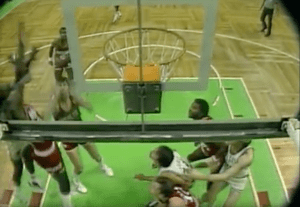
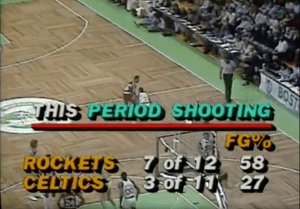
Announcers, former players and Hall of Famers Bill Russell and Rick Barry, as well as announcer Gary Bender, all point out how the Rockets are grinding the Celtics into a slow-paced half court offense; unable to get open looks at the rim, with only Bird able to hit the occasional mid-range jumper to simply put up a bucket. Most of the Celtics’ shots were missing, and when Malone is out there hawking rebounds out of the air, or gifting them to his perfectly positioned, boxed out teammates, then you’re not getting many chances to tie the game up when the Rockets were surprisingly operating rather efficiently on the other end. A 14-6 lead at the halfway point of the quarter would peak with a scrappy 14-point lead with 3:00 left to go in the quarter at 22-8, but when the opportunity finally presented itself, the Celtics struck on the break. Bird quickly found Parish up the court, who faked Malone, made the basket, and sparked the Celtics’ fast break and ball movement on a 14-7 run to close the quarter after this basket; 29-24 Rockets.
It’s interesting to note that after 4:36 of playing time, a rookie Kevin McHale was subbed in for Maxwell, much to Gary Bender’s surprise, but Rick Barry appeared slightly annoyed by Bender’s repeated question of “Isn’t it a little early to sub McHale in for Maxwell?” His non-answer suggests that it should be obvious that the 6’10” McHale would be better suited to deal with Malone, since Maxwell preferred playing near the basket, which played right into the Rockets’ strategy of sticking Malone on Maxwell in the post; meaning it was better to immediately see if McHale could be the neutralizer in that matchup. Maxwell was eventually subbed back just under three minutes later, and was then subsequently subbed out for their sixth man, M.L. Carr, who also contributed in the Celtics fast break getting fired up late in the quarter.
Malone sat in the remaining minute, and then checked back in to start the second quarter. It was more of the same for each team, as Bird continued to be the sole Celtic scrapping for rebounds against this Rockets team that was only ranked 14th in rebounds per game out of the 23 teams that season, and even more shockingly, 11th out of the 12 teams in the playoffs that year. After some lineup changes, the Rockets begin altering their style of play, as Bill Russell points out on commentary; taking Paultz off the floor so that Malone can be the sole big man in the paint, allowing the Rockets to better run the break. The Celtics adjusted, crashing into the paint, dominating the boards, running the break, and forcing Rockets head coach Del Harris to sub Paultz back in shortly after their 10-point lead had shrunken back down to five; 38-33. This was largely without the Celtics’ starting point guard Tiny Archibald on the floor, as backup point guard Gerald Henderson came in to fill the role at the 10:46 mark of the quarter.
Malone finally picked up his first two points of the night on a turnaround post fade at the 9:08 mark, shortly prior to Russell’s observation of the Rockets game plan. After an airball on his next possession, and a foul on Ford a possession later, Paultz and Archibald both check back in at the 7:58 mark of the quarter. Illegal defense is called on Dunleavy after nearly five-and-a-half minutes of play when he stops defending Archibald, who ran out to the three-point line while Dunleavy remained in the post with Malone, and away from his assigned man for over three seconds. This resulted in a free throw that reduced the lead to four points after a minute of back-and-forth half court offense. The Celtics were able to cut the lead to two, but after Bird rebounded the ball and started the break shortly after six minutes of play, he ended up throwing the possession away by lobbing the ball backwards to Archibald after light pressure in the backcourt, resulting in a lurking Malone snatching the ball from the air and hustling for a basket. Not before a few misses against Archibald and a collapsing Bird however, which ended with Malone laying it in after six-and-a-half-minutes of play.
Malone picked up another foul after bumping Rick Robey off him, a player described by the announcers as a member of the Celtics “platoon” of frontcourt players to throw at Malone without anyone actually getting in foul trouble. Inside ten seconds on the shot clock, Harris would shout “red,” in order to let his, and by virtue of his shouting, the opposing team, know that they should quickly throw the ball off the backboard in order to get a chance to at least put the ball in Malone’s hands should he grab the rebound. That’s one horrible offense, and a testament to Malone’s underrated talent that he was able to drag this atrocious system to the Finals. It isn’t smart basketball, and it certainly is a noticeable trend with this Rockets squad. The announcement team also highlighted the series of plays where Malone stole the ball on the aforementioned Bird turnover, showing how he would throw a shot up knowing he would miss, just to position himself to where the ball would go so he could finally get a good look at a shot. That’s far too much exertion for one man to be worrying himself with, and it shows you why not only were the Celtics able to win the series, but why the Rockets even made it to the Finals with a losing record; one man with ridiculous talent in a system that suited his strengths during just the right moment in time for him to sneak into said Finals.
After eight-and-a-half minutes of play in the second quarter, Bird was sat, and a lineup consisting of the Celtics’ second unit and Maxwell were outmaneuvered in the half court without him, resulting in a seven-point lead in just a little over a minute of play before he checked back in. That’s exactly why I started my opening paragraph stating this was a transitional Celtics team, as the best players of their future, more storied teams were young and not fully developed, not on the team, or not even in the NBA yet. Bird was as complete of a player they had as this time, and no one else around him knew what it took to win, even though Bird himself hadn’t won a title at any level of basketball either at this point.
Maxwell turned the ball over by accidentally handing it off to Paultz on a cut to the basket in what was supposed to be a dump-off to Robey, and a long, errant pass out-of-bounds was recovered by Archibald, who was slyly pushed out-of-bounds from behind by Dunleavy. Bird subsequently checked back in at this point with 2:45 left to play in the quarter, and the scrappy play imposed by the slow pace of the Rockets culminated in the Celtics winning a jump ball with 22 seconds left, an easy dish to Bird down the court, but still a 57-51 halftime lead for the Rockets. Paultz hit another one of his signature sweeping hook shots at the free-throw line with time expiring on the game clock. Each team had 25 rebounds at halftime, but the Rockets imposed their will, noted by the difference in field goal percentage; 39% for the Celtics, 46% for the Rockets.
A quick turnover by Archibald to start the second half would see the Rockets get a bucket on the fast break to extend the lead, 59-51. The Celtics would respond by giving the ball to Bird at the elbow, and then let their best player dish it down low to Maxwell, who finally scored his first four points of the game in rapid succession in the first minute of the quarter. The Rockets would continue their ball movement, setting screens and running around the floor, allowing Malone to use the available space on the strong-side to post up and dominate the paint. Parish and the Celtics frontcourt limited his scoring opportunities and forced him to take tough shots, but his rebounding and presence in the paint kept the offense facilitating fluidly, even with backup guard Allen Leavell starting the second half in place of Tom Henderson or Calvin Murphy.
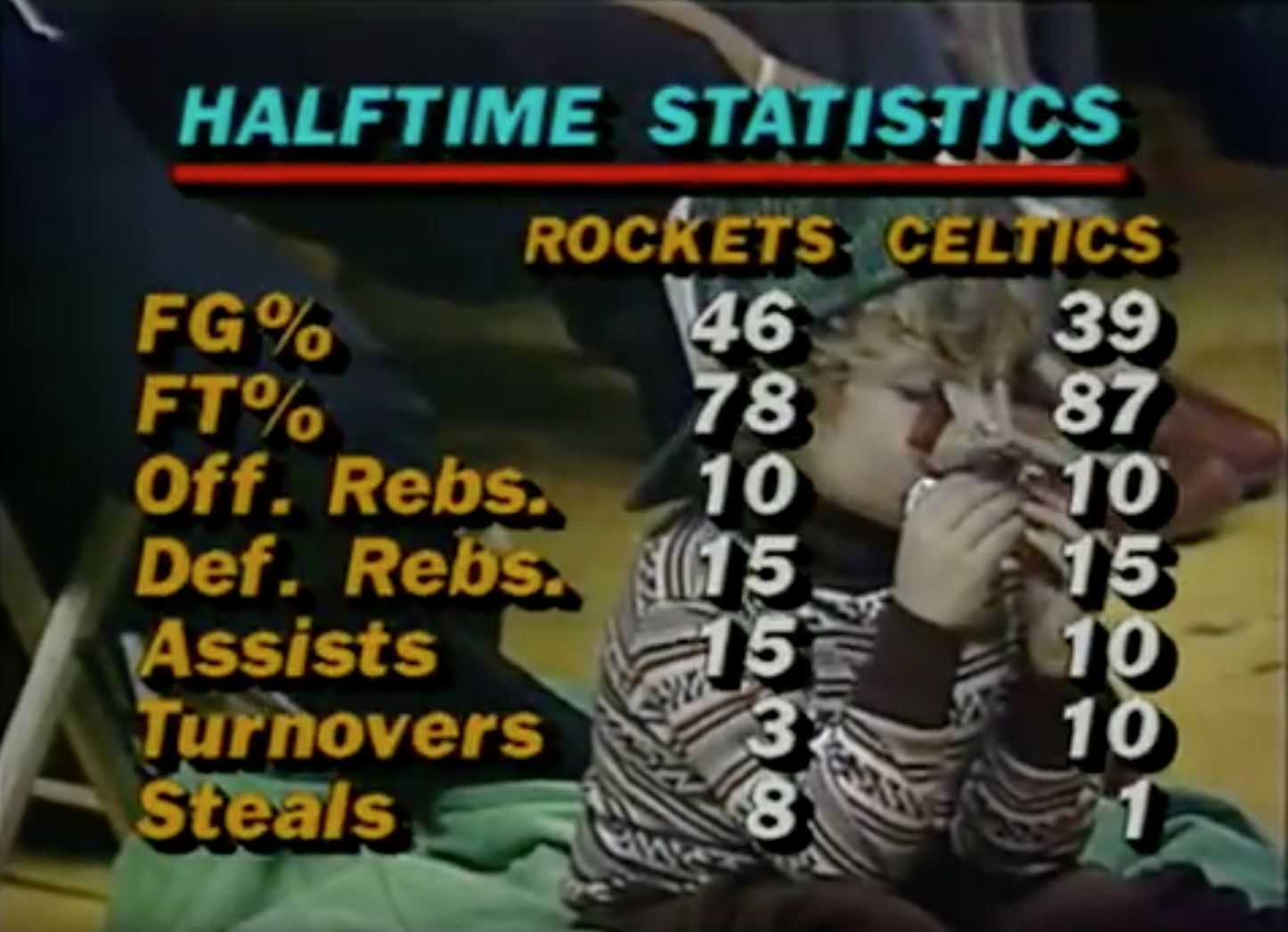
CBS’ graphic illustrates what I’m attempting to convey; the Rockets methodical game is preventing them from giving up the lead just yet, while the Celtics aren’t doing themselves any favors with their sloppy play and lack of efficiency. However, as the quarter drew closer to the halfway mark, the Celtics began locking in. A six-point lead was trimmed to one with five minutes left, as even when the Rockets disrupted a play, the Celtics, primarily Bird, would scrap for the loose ball; imagine that, a superstar doing the dirty work. The Boston Garden came alive with the crowd roaring in support of the surging Celtics for the first time all game, giving them an advantage over the undermanned Rockets. However, on the cusp of taking the lead, they resorted back to turning the ball over, passively moving the ball, and being unable to hit their shots, even on the break. Maxwell would be fouled after rebounding his own miss on a three-on-one fast break, and hit both his free throws to take a 69-68 lead with three minutes left in the quarter.
Both teams would then trade baskets until the Rockets slowed the pace back down and took a 81-76 lead going into the fourth quarter, essentially placing them right back where they were at halftime. Depth would be the difference however, as a lineup of Gerald Henderson, Carr, Maxwell, Bird, and McHale would be immediately control the pace of the final quarter; grabbing offensive rebounds, running the floor, and playing tough defense. The defense had continued to collapse and double-team Bird on the elbow as they had sporadically throughout the third quarter, leading to him repeatedly picking up easy assists in the post, ending the game with nine. The Rockets were forced to call a timeout with 9:22 left in the game after the hustle on the boards from McHale and Maxwell resulted in the Rockets’ lead being cut back down to one; 83-82.
From there it was an ugly defensive battle on the boards, as both teams came up with tough rebounds that resulted in some fouls being called, and after another minute of play, Parish was subbed back in after having to sit for a while, due to picking up his fourth foul late in the third quarter. However, after having sat only in the remaining seconds of the first quarter, Malone would sit for two-and-a-half minutes, playing the second-most minutes in the game with 45, behind only his teammate Reid. Reid had an impressive game, as he played the entirety of the game, scored the game-high, as well as his series-high in points, with 27; shooting 12-for-22 from the field, and 3-for-4 from the line.
Of course, this wouldn’t be an all-time classic game without an insane Bird highlight, so here’s the legendary play where he rebounds his own shot and puts it back up in mid-air with his left hand. Now that you’re aware of the context of the situation, giving the Celtics a one-point lead near the halfway point of the quarter in a tough, back-and-forth affair, is it not more impressive? Reid would respond with a pull-up jumper at the other end, putting him at 25 for the game, and then after three Rockets players met Maxwell in the paint, Harris called a timeout with 5:47 remaining.
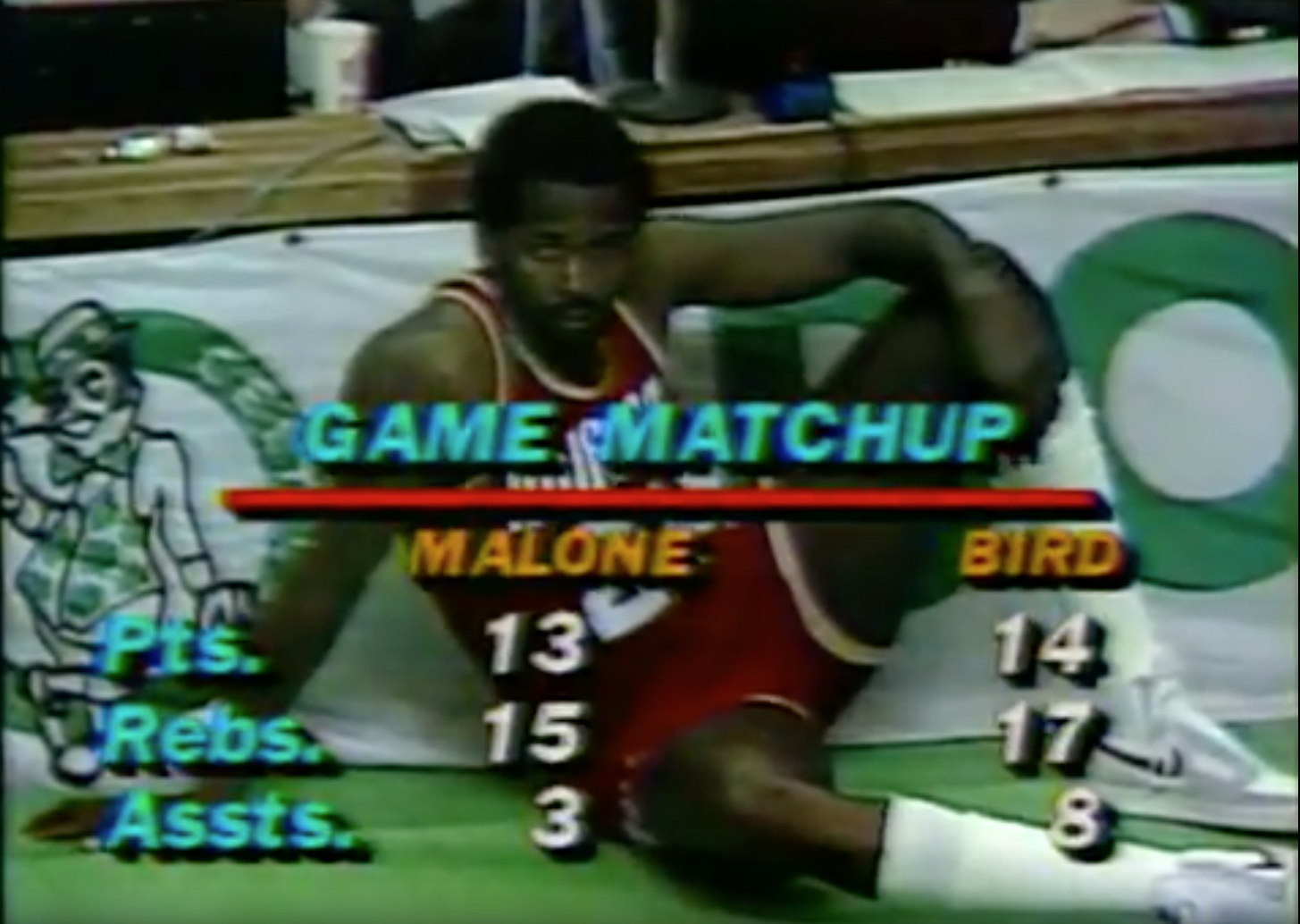
The team would operate smoothly without Malone, maintaining their one-point lead by the time he checked back into the game with around four minutes remaining. Bird would then immediately hit a mid-range jumper to take the lead, recover a timely steal from Carr on Paultz, and quickly dish it to Maxwell from the floor. The teamwork continued, as he would run the floor and kick it to Carr for an easy dunk after drawing Reid over to him near the basket. 94-91, the biggest lead the Celtics have had all game. They would end the game with that same margin of victory.
All the Rockets screening and ball movement was rendered ineffective against the rejuvenated Celtics defense, as they took away any open space for a drive or a shot, resulting in Bird snagging another rebound, and picking up another assist in the form of a long pass downcourt to a streaking Maxwell. This gave the Celtics a 96-91 lead with 2:56 remaining. After the subsequent Harris timeout, it turned back into a half court game, with the Rockets making their next two opportunities to make it a one-point game with 1:34 remaining, but when it mattered the most, this team couldn’t grab a rebound. Ford grabbed two offensive rebounds, allowing Archibald to hold onto the ball and call plays to get Bird the best look possible for a game-winning shot, but after running off an entire minute and 15 seconds of game clock, it culminated with Bird putting up a tough shot, maintaining position, grabbing his miss, and using a hop step to get a better position for the Celtics’ final basket. Four offensive rebounds in the final minute will do that for you.
Unfortunately, footage of the final 19 seconds is hard to find, as all footage I’ve found cuts out the final play entirely. Since the score didn’t change, remaining 98-95, I’m assuming the Rockets used the entire clock and missed a shot, but again, I can’t confirm without footage. The NBA of the early ’80s was still suffering from the ’70s stigma of being a “black cokehead” league with Middle America, and didn’t quite have the attraction the other popular sports did at the time. CBS picked up the broadcasting rights prior to the 1973-74 season, and after continuing ABC’s practice of airing Finals Games live on television for the ’74,’75,’76,’77,’78, and ’79 Finals, albeit while mishandling the scheduling and being fairly inept in their promotion of the league, they ultimately harmed their own product even further by taking the NBA a step back; airing weeknight playoff games on tape delay at 11:30 p.m. EST, only playing games live if they were in the Pacific timezone, which is 11:30 p.m. for the people living in Eastern Time anyway. This was due to the lack of faith the network had because of the fledgling regular season ratings, as well as insatiable greed in not wanting their competitors to be able to broadcast the scores to the games on their own networks during primetime. However, their refusal to air live games of the championship round during that same time slot obviously didn’t help at all.



This led to the lowest Nielsen Rating the Finals ever produced up to that point with a 6.7, which is still the third-lowest rating the Finals has ever produced. Four of the six games were broadcast on tape delay, and to put it bluntly, the network knew they fucked up. This would be the second-and-last Finals to be broadcast this way, however, the network wouldn’t fully learn from their lessons, as they continued to air non-Finals playoff games this way well up until 1986. NBC would later gain the rights from them prior to the 1990-91 season, and that network’s first Finals telecast would be the ’91 Finals, which I, coincidentally, have already written an article on3. Nobody should feel bad for CBS, as the company is partially responsible for the negative reputation and the regression of the NBA in the ’70s and early ’80s, before the Magic vs. Bird narrative would reach its peak and ultimately save the NBA.
Bird’s 18 points in Game 1 came on 9-for-17 from the field, while also chipping in with the aforementioned nine assists, but had an impressive 21 rebounds; six more than even Malone. His 43 minutes and all-around performance was instrumental in keeping the offense facilitated, as five other players on the team were able to score in double-digits, even if Parish was second on the team with only 16. They clamped down when necessary, out-rebounded the Rockets when it mattered the most, and beat them at their own game, even if they were expected to blow this team out. The Rockets however, proved they were more than talk, and looked to execute better in Game 2.
Game 2 – May 7th, 1981
Malone’s 52.2% field goal percentage for the regular season dropped to 47.9% for the playoffs, of which his 4-for-17 from the field in Game 1 contributed to. He grabbed 15 rebounds, but took tough shots that were often bad looks or heavily contested, and most of his eight offensive rebounds came in the form of putbacks of his own misses. Of course, the most important thing to remember is those stats didn’t come in the final minutes, when it mattered the most.
Looking to reverse that trend, the Rockets attempted to get Malone going early, and he rewarded them by scoring the first points of the game on a turnaround jumper from near mid-range. It would also be the first two of his series-high 31 points for the game, as Harris sought to continue executing on their game plan from Game 1, for better or worse. Another fast start in the opening three-and-a-half minutes would be countered by a minute-and-a-half, 8-0 Celtics run; getting their break going when Malone wasn’t grabbing offensive rebounds and getting easy tip-ins, as he had during the opening three minutes for seven of the Rockets’ ten initial points.


Archibald finally showcases some range, hitting a long two to tie the game up, 12-12, after Malone made a crafty move in the low post, sweeping under to make a layup from off-the-glass on the opposite side. Russell’s commentary seems rather dismissive of the Rockets’ offense whenever Bender or Barry mention that they’re getting Malone more involved, as if he’s reminiscing on when his teams would beat Wilt Chamberlain’s teams throughout the ’60s. Bender already mentioned how Russell made a point where if they highlight Malone too much it will hurt the team as a whole4, and one would have to agree until you remember that this team largely made the Finals on the back of Malone’s play that resulted in him earning a fourth-place MVP finish. Boston was deeper and everyone knew it; not only were Archibald and Parish ninth and seventh respectively in MVP voting that season, they were led by a confident, young Bird who was more athletic than in his later years, while still retaining his underrated athleticism that mostly showed through in his veteran-like reflexes. This was why he was second in MVP voting in just his sophomore season, behind only Julius Erving, whose team he beat in the aforementioned all-time classic 1981 Eastern Conference Finals.
A timeout with 2:56 to go in the opening quarter was called by the Celtics after they had made themselves a two-point lead, but they were unable to extend the lead much further than that. The quarter as a whole largely played out similar to Game 1, with rebounding, positioning, and defense being the deciding factor of most possessions, as the Rockets’ methodical offense fed Malone consistently, even as he started chucking up bad shots from near mid-range. However, they were able to draw fouls by playing physical and getting the ball down low, resulting in offensive rebounds that would keep their possessions alive. Conversely, the Celtics were able to swarm Malone, sometimes drawing up to four defenders on him, resulting in bad shot selections, which led to easy baskets for the Celtics, due to the Rockets’ inability to defend their fast break. Occasionally the Celtics were forced into a half court game, and it was only in these scenarios that the Rockets were successful in slowing down the Celtics, preventing the lead from increasing.
The announcers noticed that the Rockets found interesting matchups, forgoing traditional positional defensive sets in favor of allowing Malone to anchor the post; allowing their best player to constantly play to his strengths on either side of the ball. A 26-22 Celtics lead after one quarter remained the same margin by halftime, as the Rockets stalemated the Celtics this quarter, 23-23; 49-45 at the half. It was more of the same, to put it bluntly. Malone at one point had 14 of his team’s 28 points, but if I’m going to be fair, then I will address the fact that no one else on the Rockets was playing near the level they did in Game 1. Reid scored 27 points in the opening game, and in this game went 0-for-7 with only two points. Only Bill Willoughby shot over 50% from the field for the Rockets, scoring 14 points on 6-for-10 shooting and 2-for-3 from the line; their backup small forward did more to help their cause than their starting small forward, in a game where they were out-rebounded by 13 no less. It makes you wonder how they were able to win this game and extend the series to six if we’re being honest.
Maxwell heading to the locker room with 9:39 left in the first half was the start of his decline in this game, even if he did end up playing 37 minutes. Robey, McHale, Bird, and Parish couldn’t quite replicate the style of play the Robey, McHale, Bird, and Maxwell lineup was capable of, and the Rockets took advantage of the slight mismatch by slowing the pace down; keeping themselves in the game with timely rebounds and frequent trips to the foul line. Maxwell sauntered back to the bench a minute later with cotton in his nose as the Rockets tied the game up in his absence, 31-31. However, the Celtics took back control quickly, as the undersized 5’10” point guard and sixth man for the Rockets, Calvin Murphy, shot ineffectively from the field in this game, contrasting greatly to Boston’s sixth man, Carr, who could always be reliably plugged in for an overall tough and efficient effort on both ends of the floor. Malone would play all 48 minutes in this game, and it had to have taken every ounce of his talent and will to pull off an upset win in Boston Garden as his team struggled to get going around him.
His 18 free throw attempts would lead both teams, and largely contributed to his team’s 32 overall free throw attempts, which dwarfed the Celtics’ 13. Bird would see the bench for the first time with 6:22 left in the half, and Maxwell would return to the court in his place. McHale would ultimately prove himself to be the key in this first half, as a large majority of their rebounds and fast break chances, as well as his playing time, came when playing at the power forward position in this first half; showing glimpses of what their legendary future frontcourt would be capable of. However, without Bird on the court, the Rockets’ hustle gave them the edge, as they fought to quickly tie the game from four points down with four minutes left in the half, forcing Bird to quickly check back in once Murphy’s first of two free throws at the same mark in the game connected to tie it back up, 41-41.
Immediately as soon as Bird checks in, Maxwell checks out, and the Celtics’ fast break heats back up to a 47-41 lead. Robey draws his third foul soon after, and Maxwell is subbed back into the game. It’s interesting to see Celtics head coach Bill Fitch stagger the minutes of his stars so that they all see over 30 minutes a game, while maintaining a fluctuating rotation that would see them incrementally rest without jeopardizing his team’s position in the game. Parish would only see 14 minutes of action in this game as a result of foul trouble, which largely contributed to the Celtics’ loss. It’s why you haven’t heard me mention him in this first half, as he largely sat on the bench due to picking up two quick fouls on Malone in the first quarter. This forced Fitch to really rely on that fluctuating rotation, as that platoon of frontcourt players were tested greatly in this game, with each of them also picking up at least three fouls.
To counter that, they needed to play smarter, and this is how you properly execute full court basketball. This highlight served as the final basket for the Celtics in the half, and capped off an 8-0 run to give the Celtics a 49-41 lead with 19 seconds left. The Rockets would respond by having the ball deflected out-of-bounds with 12 seconds remaining, and then locking in to feed the ball in the post with a beautiful lob pass to Paultz, who quickly banked the shot in. Tom Henderson then stole the ball on a careless inbound pass by McHale, quickly fed the ball to Malone, who slammed it down with four seconds left to end the half strong for the scrappy Rockets. The quick, downcourt passing of the Celtics led to a large number of turnovers, as was the case in Game 1. When you live and die on this type of play style, you have to accept the reality of possibly throwing away a game you can easily win. It’s why they struggled in Game 1, and it’s why they let the Rockets stay alive in Game 2.
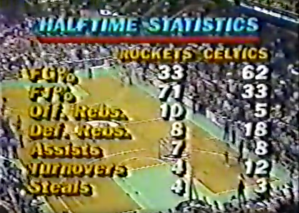


Parish would pick up his third foul within 10 seconds of play in the third quarter, and the Rockets would begin moving and screening better in order to get Paultz easy one-on-one shots against the slightly shorter Bird near the basket or in the mid-range. This play-calling extended to Dunleavy as well, as the Rockets looked to get him more involved after being roughed up on the offensive end in the previous game while also shooting incredibly poorly from the field; 2-for-9. He would score only nine points this game, but without forcing anything, while simultaneously adding diversity to the offense, as he went 2-for-2 from behind-the-arc and 1-for-2 from the line; 3-for-5 overall. He hit a pull-up mid-ranger jumper after rolling around a pick from Paultz to give the Rockets a 51-49 lead, but Parish connected on a tough mid-range jumper at the 8:42 mark of the third quarter to tie the game back up, 51-51. He would then pick up his fourth foul after pushing Dunleavy, who attempted to go around him to pick up Ford on the perimeter, and after only playing nine minutes in the first half, Parish would be subbed out with four fouls after playing only three-and-a-half minutes in the third quarter.
It wouldn’t matter too much, as Bird continued rebounding well, grabbing another 21 rebounds this game, being the sole spark plug to the Celtics’ fast break. The Rockets attempted to match the Celtics’ vigorous energy, but ended up turning the ball over for an and-one opportunity by Archibald, who was heading the Celtics zesty fast break. He converted his free throw, but then Dunleavy hit another one of his threes, and Malone followed up with by making his next shot while also picking up a foul on Robey; giving the Rockets new life as they slowed the game back down to once again tie the game up by the end of the quarter.
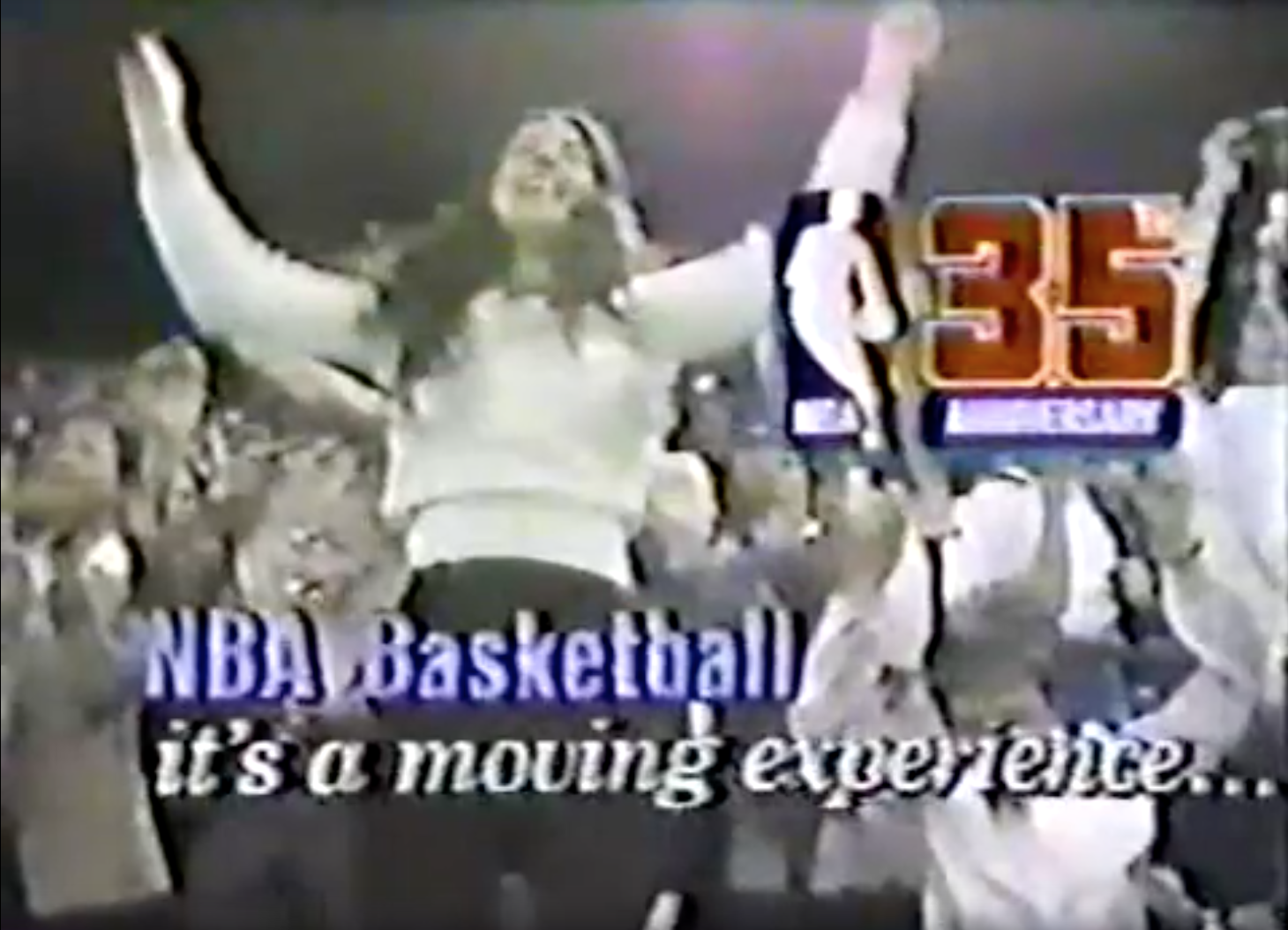
Bird continued pulling down rebounds and igniting the break to take a five-point lead within the first minute of the 4th quarter, seemingly setting up the Rockets for their deathbed. However, after several minutes of play, and with an 82-75 lead, the Celtics gave all the space in the world to another small forward off the bench in Calvin Garrett, and he hit the shot to cut the deficit back to five. The ensuing possession would see Parish pick up his fifth foul, and he was immediately sat. Paultz posted up and used his footwork and height to bank in another shot and cut the lead down to three. After a tough defensive stand, Malone drew another foul and made one of his two free throws to cut the lead to two, and the Celtics would call a timeout with 5:42 left to play.
The Celtics were unafraid to go into their half court offense once the final quarter started, and even as the Rockets chipped into their lead and forced turnovers, the Celtics still shot well from the field; 50% for the game overall. Ultimately it wouldn’t even be their play style that failed them, just their lack of execution. Their turnovers, fouls, and Bird’s technical all costed them a lead with only 3:22 left in the game. Parish picked up his sixth foul on an over-the-back foul shortly after checking back in to prevent Malone from further drawing fouls, and suddenly, the Celtics deep frontcourt had become attenuated. McHale already had five fouls, while Robey and Maxwell had both been playing with four; tough situation for the Celtics to find themselves in with only 2:45 remaining in the game.





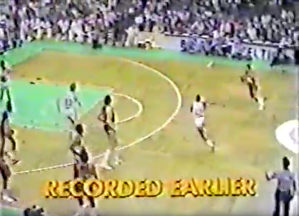


A turnover by Bird at the 1:20 mark resulted in a Rockets timeout with 1:12 remaining, and an 89-88 lead. Malone free throws had gotten them a three-point lead in the minute between Parish fouling out and Bird’s turnover, and after Malone rebounded Bird’s miss with 38 seconds left, the Rockets called for another timeout with just 35 seconds left. Harris drew up a play that would allow Malone to kick it out the second option if he was pinned in the post, giving Leavell enough space to dash forward and take a pull-up mid-range jumper to take a 91-88 lead with 28 seconds remaining. Archibald drew a foul with 18 seconds left, made both his free throws, and the Rockets responded by using their final timeout.
Dunleavy was trapped on the ensuing throw-in, but drew a foul, making his second after missing the first; 92-90 Rockets lead with only 11 seconds remaining. The Celtics use their final timeout, drew up a play that would see Archibald walk the ball to the left elbow, have Bird run under the hoop and all the way around a wall of screens set by the other three members of the Celtics, receive the ball at the free-throw line, go up for a shot, and then dish it off to a wide open Archibald at the elbow if he drew the double team. Archibald’s miss bounced up high, effectively running out the game clock before anyone could officially rebound it. The Rockets proved they could go into Boston and beat the Celtics on their home court, silencing the Celtics’ raucous crowd as both teams filed off the court into the locker room.
Game 3 – May 9th, 1981
After dropping a game at home, the Celtics knew they would have to tweak their approach if they wanted to beat this team. They lost Game 2 even though they shot much better from the field in that game than in Game 1. They simply had too many fouls, too many turnovers, and with the Rockets playing smart defense when it mattered the most, as well as Archibald missing the game-tying shot, meant that the Celtics would have to pass the ball better in order to beat this solo star-centric squad. Malone shot poorly again from the field in Game 2, 10-for-24, but was a bully in the paint, drawing frequent fouls and grabbing rebounds. Bird had a similar stat line as in Game 1, but his three assists fell way short of the nine he recorded in Game 1, as the Celtics simply played far too relaxed in Game 2, generating only 82 shots compared to the 95 they attempted in Game 1. They destroyed the Rockets on the boards, but did not create enough scoring chances for themselves to overcome their opposition’s grinding effort.
You would think then that they’d come out better poised than this, but it would be almost uncharacteristic of this squad to come out to a good start for once. Archibald missed another wide open long two, and the Rockets’ crowd cheers their underdogs on as they slowly walk the ball up the court. Ball movement, defense, and momentum seemed to favor the Rockets in these opening two minutes, as the Rockets home crowd came out in heavy support for their franchise’s first NBA Finals appearance, which was still being labeled as the NBA World Championship Series/Finals at this point in time. This was only their seventh consecutive home sell-out, so the bandwagon was in full effect, but being the first under-.500 team to make the Finals since 1959, and also being only the third team in NBA history to do so, will grant you that underdog angle regardless of your franchise’s history; not to mention they were playing against the most storied franchise in the NBA during a callow point in their ’80s dynasty.
However, the Celtics’ composure wouldn’t waver in these opening minutes, choosing instead to meet them in their half court style of play; generating turnovers and grabbing rebounds to initiate their fast break. Parish would pick up two fouls with nine minutes to go in the first quarter, but the Celtics never allowed the game to get away from them, getting shooters open on the elbow or getting good looks at the basket. Instead of battling the Rockets in an attempt to get their own offense going, the Celtics instead gifted them the pressure of taking a 2-1 lead in front of their home crowd, and dared them to continue operating as well as they did on the road, when all the pressure was on the Celtics to blow this team out.
Tough, intelligent defense by the Celtics prevented any large, early leads, meanwhile, the scrappy rebounding and timely steals, led by Bird continuing to sneak into the post from the elbow to crash the boards and/or hit the floor, kept the Celtics afloat offensively as they struggled to even get a good look at a shot, let alone convert on one. Parish’s three fouls early on would see him have to lower his intensity in the post on both sides of the ball, but thankfully for the Celtics, Maxwell was able to step up and show some grit in his place. Their physical efforts would pay off, as a poor shooting performance by Paultz in the quarter would continue for the rest of the game, going 2-for-10 from the field. Willoughby would check in with 2:44 left in the quarter, down 18-13, forcing the Rockets decide to speed the game up slightly after allowing the Celtics to come into their house and use their own brand of basketball against them.
Reid’s defensive effort on Bird must be noted in this quarter, as Bird was shooting 51.4% from the field in the first two games of the series, all while being the best rebounder on the floor, and perhaps the best facilitator as well. His six assist average in the first two games doesn’t pop out, but his nine in Game 1 and three in Game 2 paint a more vivid picture on how the Celtics’ offense subtly used Bird’s positioning on the elbow to manipulate defenses into reacting to even the most minute of Bird’s movements; getting easy shots for himself and his teammates. He was clearly held in check this game, starting out with only three points in the quarter on 1-for-3 shooting to go along with a turnover, as well as going only 1-for-2 from the line, but his passing, rebounding, and help defense were instrumental in facilitating the Celtics’ system. Reid would play Bird tight, attempting to push him further out to the three-point line and allow his teammates to pick off any passes, or even flat-out fouling him when unable to get in a clean-enough position to box him out. This would lead to poor shooting from Bird, as he only scored eight points in the game on 3-for-11 shooting, and after leaving Paultz wide open at the free throw line for a buzzer-beating shot to cut the Celtics’ lead down to four, 21-17, it would be up to Bird to look for other ways to lead his team to victory.
He would finish this game with his series-high 10 assists, and after a timely steal by Gerald Henderson to start the half, the Celtics facilitated the ball to Bird on the right-hand side of the court, on the elbow, where he then dished the ball to Maxwell, who had successfully pinned Malone under the rim; right in his spot. That was Maxwell’s sixth point of the game, and from there-on-out, he would play with a new sense of confidence, reverting back to usual brand of reliability. He would finish the game with 19 points, leading his team’s well-balanced attack; second only to Malone’s 23 for the game overall. Garrett would check into the game for the Rockets with 9:02 remaining in the half, and his defense on Bird was comparable to Reid’s, as the pair both slid down a position defensively to harass the superstar forward. It wouldn’t matter, as Bird had already grabbed nine rebounds and made the passes necessary downcourt to ignite the Celtics’ fast break and inflate the lead to 12 by the time Harris called a timeout with 7:22 remaining in the half; 31-19.
The Rockets would insert Paultz back into the game in an attempt to slow the game back down, and their half court offense was rewarded with Malone hitting one of his two free throws after drawing a foul on Robey. The Celtics would respond by going right back to Bird on the elbow, finding Ford under the basket for an easy assist after Ford made a simple backdoor cut from the opposite corner of the court. Maxwell was switched onto Paultz on the ensuing possession, and Paultz simply shot over the shorter defender for his fourth points of the night, but the Celtics simply ran another play for Bird on the elbow, this time finding Maxwell near the basket, who converted on a fadeaway hook over the taller Malone. Paultz would draw a foul to answer the Celtics machine, but missed his free throws, and then allowed Robey to post him up on the other end of the court and score inside on him.
The remaining three minutes would see the Rockets get their act together and whittle the 17-point lead down to eleven. This was primarily due to Malone getting more physical, and his team returning to their scrappy style of play. Robey would pick up his third foul near the end of the quarter, and it’s worth noting he played the entirety of the second quarter in place of Parish, who he had equaled in number of fouls by the time the half had come to a close. McHale would have no real impact in this game, playing only 12 minutes, and really only coming in to serve as a platoon piece. Robey was also a platoon piece in the first two games, but had to prove his worth this game as he was forced to pick up the primary defensive responsibility on Malone in place of Parish.
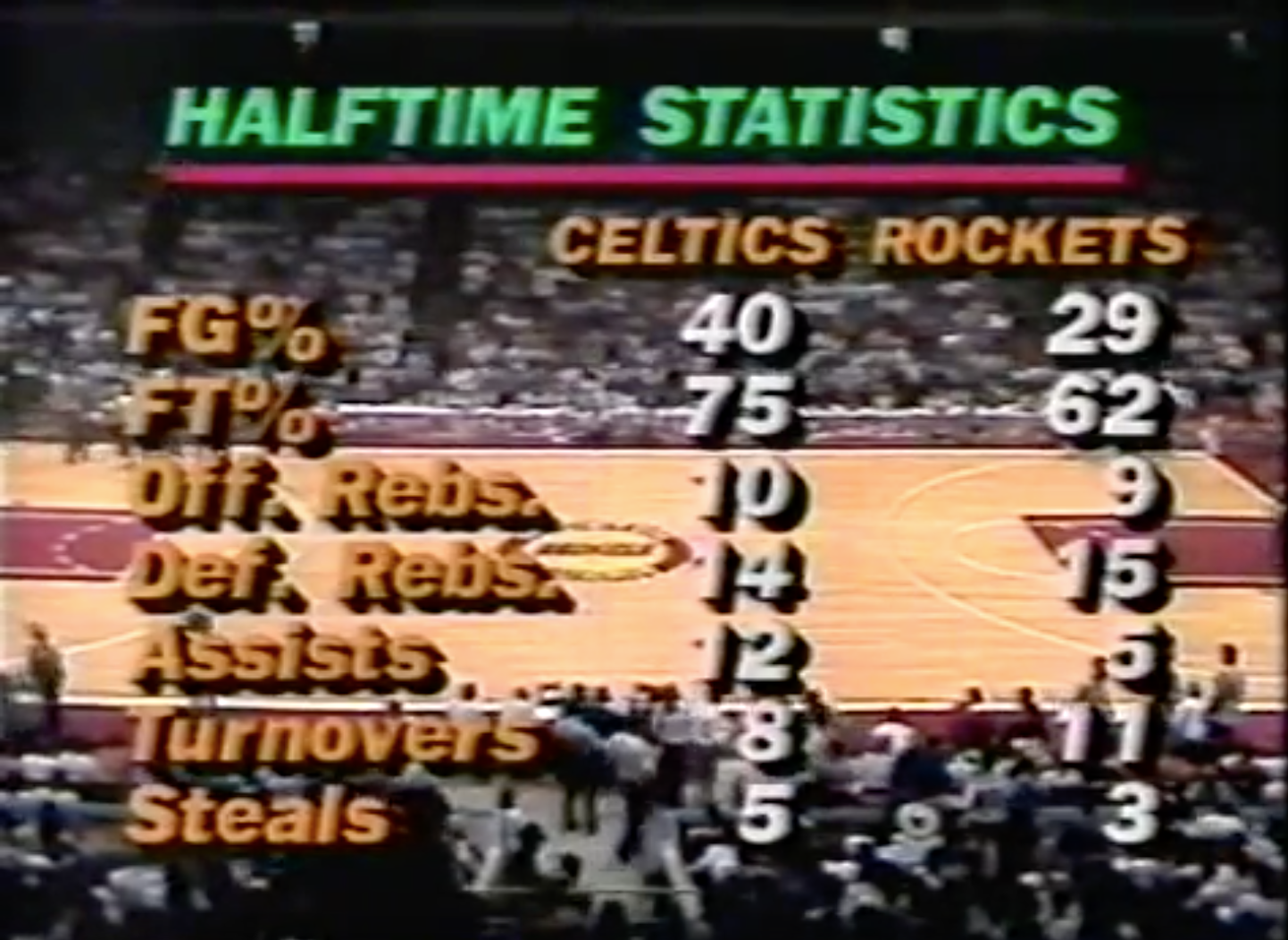
The halftime statistics would make one ponder exactly how the Rockets were able to hamper the Celtics’ momentum and cut the lead down by half, even if they still trailed by more than 10. The rebounding battle is close, and the difference in steals is close as well, but the Rockets were shooting so poorly, not facilitating the ball well, and for the first time all series, losing the turnover battle. Even if the difference in turnovers is only three, the assists prove the Celtics were taking the Rockets’ turnovers and turning them into successful fast break opportunities, while the Rockets five assists and 29% field goal percentage proved they weren’t doing much of anything with the turnovers they did generate.
The Rockets would start the second half strong however, as Malone picked up another rebound and foul on Parish quickly in the opening seconds of the third quarter, and converted on both his free throws. Both teams would then descend into a playground play style for the next three minutes, as they each wasted possessions by simply playing like mirror images of each other. They boxed out well, ran up the court, passed to their most open teammate, and either made or missed the shot. Ford would kick the ball with 8:55 to play in the third quarter, and Harris would call a timeout. The Rockets had found themselves down nine, and if they wanted to truly break the Celtics’ will, now was the time to get in breathing distance of the lead.
Reid would handle the ball in the mid-range against Maxwell, and would take a jump shot that clanked off the rim, which was then tipped back towards the sideline by Willoughby over Bird, which led to Reid grabbing the rebound, stumbling, and kicking it back out to Tom Henderson to reset their offense. Reid would handle the ball once more against Maxwell, but this time he would kick the ball to Willoughby at the free throw line after Bird was briefly caught by his own teammate after sly off-ball movement from Dunleavy. Willoughby would hit his second shot of the third quarter, and his last jump shot for the game, as the rest of his 12 points came from the free throw line. His 31 minutes came largely from the result of Harris choosing to start him in the second half, and the initial spark he provided with his scoring, rebounding, and defense all assisted in cutting the lead down to five with 8:27 remaining in the third. Parish would pick up his fifth foul with 7:45 remaining in the quarter, and this would seemingly put the Celtics in a tough situation, but in reality, it would be their wake-up call.
The next possession would see Parish score in the low post on a quick pass from Archibald, and then on the other end of the court, Ford would poke the ball away from Dunleavy. Archibald would recover the ball, kick it up the floor to Parish, and he would make the shot and draw a foul on Malone; his sole foul of the game. Parish’s made free throw would push the lead back to 10 in a 34 second time span, and when paired with the knowledge that he was playing with his fifth foul and had been outplayed by Malone throughout the series, it undoubtedly demoralized the Rockets. Barry pointed out on their ensuing possession that the Rockets were “standing around too much,”5 which culminated with a lackluster, heavily contested mid-range jumper at the free throw line by Willoughby. This contrasts greatly to the Celtics’ fast break, which effectively ended the game on this possession, as no matter how hard the Rockets fought, the Celtics proved they could answer back with surfeit, swift efficiency.
Once again, Bird’s positioning on the elbow, coupled with his superb, and often under-appreciated passing skills, easily manipulated defenses into focusing so much attention onto him that the other four Celtics had an easier time moving off-ball and getting open looks. After a little over five-and-a-half minutes of play, the Celtics only needed a minute and nine seconds of game clock to inflate the lead to 16. Both teams would miss their next shot, but then Bird would recover a loose ball, fling the ball downcourt to Maxwell, who then dished it off to Ford for an easy layup. Malone would counter with a tough shot off-the-glass, and it would be a 54-38 Celtics lead at the five-minute mark of the third quarter. A quick back-and-forth would be broken up by Bird’s instincts, which earned him another assist on the fast break, this time to a streaking Archibald.
Parish exited the game at the 6:36 mark, but not entirely because of his fifth foul, as I believe Fitch would have been okay with him fouling out in this instance, as Robey had been a great deterrent in this game. A cut sustained from a forehead collision with Malone had formed above Parish’s eye, and he would have to exit to the locker room to have it treated. Robey would have checked in Parish’s place anyway regardless of the injury, but the way he was able to help frustrate Malone, and stagnate the Rockets offense as a result, was instrumental in the Celtics’ victory in this tough game on the road.
Bird would grab another rebound, and heave it downcourt to Ford, who was fouled by Murphy. The subsequent free throw would be Ford’s 17th and final point of the game, but he would continue being a pest on the perimeter, as he stole a pass intended for Murphy from Malone, who chose to post up at the free throw line of all places. Murphy would chase Ford from behind across the court, and managed to rip the ball from him, but stepped out-of-bounds; continuing his poor play on what was also his 33rd birthday. Maxwell would then be fouled by Murphy at the 2:40 mark, and made his second free throw to increase the Celtics’ lead to 20. Willoughby’s hustle play would result in a pair of made free throws with 2:12 remaining, but then the Rockets would fail to secure the rebound, and the Celtics would grab two offensive rebounds to run off 57 seconds of clock; culminating in Robey of all people driving the lane, drawing a foul, and making a finger roll.
Robey would pick up his fourth foul in the final 30 seconds of the quarter, and the scrappy, back-and-forth that ensued after that ended with a crafty play designed to sneak the ball inside to Malone, who ended the quarter with 21 of his 23 points. The Rockets would need his strong play to win this game, but unfortunately for them, the Celtics played much smarter in this game, and kept control throughout. Malone would have his best game of the series thus far, scoring 23 points on 7-for-13 from the field, 15 rebounds, and 4 blocks, but the rest of his team would shoot a combined 27.5% from the field, and just 30.4% even when factoring Malone in the equation. Rather than stick to their guns like the Rockets, the Celtics addressed all their concerns directly; taking better care of the ball to not let the game needlessly get away from them. Malone can have a strong performance, because when the Celtics win every quarter by four-to-six points, the deficit slowly adds up.
The Rockets had a chance to take command early, but never did. The Celtics were incredibly content in letting the Rockets set up their offense, using Bird to ignite their break and counter the Rockets’ half court offense with their own diverse offense. Maxwell continued doing what he had done all game, and that’s battle deep in the post for his shot and grab rebounds; second on the team in this game with 10 to only Bird, who had 13. The focus would be on Bird, and he used the Rockets’ misguided defensive efforts to create plenty of space for his teammates to move around without the ball, providing them with easy opportunities to score.
Relentless post presence by the Celtics would ultimately be the key for them in this game, as the Rockets would also swarm the paint, but were rather unsuccessful in their pursuit of points in the paint. Bird’s playmaking at the elbow deconstructed the Rockets’ defense, as they were unable to stop Maxwell in the paint, even with Parish being absent for a majority of the game. His 17 minutes would normally put the Celtics in a position of weakness, as it did in Game 2, but when you’re operating on all cylinders, you find yourself compensating for things whose absence would often be detrimental. Archibald would shoot 5-for-13 from the field in this game, and his stats across the board had regressed from the regular season, but he had just a single turnover in this game, and as the primary ball-handler in this offense, when he’s able to dribble the ball around the court and keep the offense in motion while still attacking, running the break, and finding the open man in order to keep the offense running fluidly, the Celtics were nearly impossible to overcome.
Malone would exit the game with seven minutes remaining, in an effort to conserve his energy for the game tomorrow, as Game 4 would be a rare back-to-back game in the Finals, the second time this happened in as many years. Barry would note how ineffective Malone usually was on a back-to-back earlier in the quarter6, and there’s little doubt in anyone’s mind it played a factor in Harris pulling Malone with seven minutes left in the game, as he knew it was time to concede and start planning for the next game. McHale would see the court for his first real minutes of the game, but we were effectively in garbage time already. The Rockets offense wasn’t explosive enough to make a 20-point comeback, especially without Malone, and the Celtics weren’t inept enough to blow such a large lead. Russell flatly told Bender he wasn’t shocked the Celtics would be blowing the Rockets out with Bird only scoring eight points7, his final point coming from a free throw in this quarter, and it really highlights the differences in thinking between a casual observer and someone with a higher understanding of the game. The Rockets would also need a higher understanding of the game in order to beat the Celtics, or a miraculous, galvanizing effort.
Game 4 – May 10th, 1981
A 23-point margin of victory for the Celtics, which included holding the Rockets to a then record-tying lowest amount of points scored in an NBA Finals game with 71, came back to bite them in the ass the following night. Malone would be assigned to guard his traditional assignment for the first time all series, and on the first possession, it didn’t seem to matter in the slightest. The Celtics won the tip-off, and Bird simply dished the ball down to a streaking Ford for a crafty layup just seconds into the game, and it honestly seemed as if the Celtics had the Rockets all figured out.
Reid grabbed an offensive rebound, showing life for the first time since Game 1, and even if Parish blocked Paultz’s sweeping hook, even if Reid missed his shot and Malone also missed the put-back, the Rockets constant hustle was enough to force a mental gaffe by the Celtics as the ball rolled out-of-bounds, allowing the Rockets to maintain possession. Malone was eventually fed the ball in the low post, and he bullied his way to a basket; a subconscious confession by the Rockets that they were not capable of anything beyond the shallow system that Harris designed and implemented.

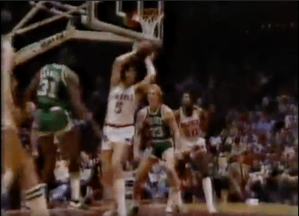
Paultz ratcheted up his intensity, and made most of his contributions to the overall team output in this first quarter. He would only shoot 5-for-14 from the field, but scored four of his 10 points in these opening five minutes. The Rockets, even in this first quarter, shot poorly. Their paltry 35.9% shooting overall was far outclassed by the Celtics 47.3%, but the Rockets demonstrated they could always resort to playing hard-nosed basketball and grind out a win; it was their entire identity after all.
The pace completely favored the Rockets from the opening tip, as the 87.3 pace was the slowest either team played all series, and wound up being second only to the final game; 87.0. This benefited the Rockets tremendously when they were also able to finally broaden their offensive sets and get Dunleavy more involved in the offense; lightening Malone’s workload. It didn’t appear as if the Celtics were as focused as they needed to be, as they briefly gained a four-point lead over the Rockets, only to see the Rockets hustle immediately tie it back up. Offensive rebounds and steals would be the key, as a rare Rockets fast break tied the game at 14 before the Celtics would feed Parish in the high post, allowing him to hit fadeaway jumpers over Malone. It worked to a degree, as it finally got Parish more involved in the offense, but when the scrappy underdogs are playing confidently and sticking to their game plan, the Celtics would need to put the nail in the coffin and break their spirit, and instead they allowed them back into the game, and the series.
Bird would connect on two mid-range jumpers, one that was gifted to him courtesy of a Maxwell double-team in the post upon his first touch of the game, and that would be it from him, as the Rockets once again forced him to shoot 3-for-11 from the field for a grand total of, once again, eight points. Unlike the 13 rebounds and 10 assists from Game 3, where he still able to manipulate the defense without even being a scoring threat for the game, he was much more passive in this game. Parish would lead the team with 16 shot attempts, and the Celtics established him as the primary scoring threat early on in this game; content with feeding him the ball in the high post for fadeaway jumpers. The Rockets wouldn’t allow them to continue that strategy, so they switched Paultz onto Parish, and the Celtics played right into their hands by continuing to feed the big man.
Fully aware they would have to do more in order to secure themselves just their fourth home win of the entire postseason, and keep themselves afloat in the series, the Rockets came out strong in this quarter. Tom Henderson never held the ball too long, preferring to quickly kick it out to Dunleavy after he came off several screens for an open jump shot, or to dish it to Reid on the opposite side of the court where he would then facilitate the offense. Either way, both Reid and Dunleavy were successful in grabbing their own missed shot attempts in this quarter, as the Celtics were much too reactionary in this game overall, a major reason why the Rockets were able to grab 28 offensive rebounds; largely why the Rockets won the close rebounding battle, 49-47, and the game. They relied solely on their core six players, as only Willoughby came off the bench for them in this game, accumulating 24 minutes as the sole backup to multiple positions, allowing Harris to get creative with player positioning. Paultz would pick up his third foul with just 2:29 remaining in the quarter, and that’s when Willoughby would check in, guarding Bird at the four while playing offense at his natural small forward position.
Reid would make a shot at the rim on Maxwell, only for Maxwell to finally show some aggressiveness and pick up a foul on Willoughby on the ensuing possession. The Celtics were finally able to secure a rebound and initiate their fast break, but Reid stripped Archibald from behind, and Dunleavy heaved a pass downcourt to Willoughby for an easy dunk, and a tie game. Bird was able to inbound a downcourt pass to initiate the Celtics’ fast break, but their offense slowed down to allow Maxwell to post Willoughby up, and make his own turnaround hook shot to take the lead once more. Dunleavy would hit a tough shot in the Rockets’ half court set, and the remaining 30 seconds would end with the Rockets and Celtics respectively turning the ball over. Bird missed a wide open shot at the elbow, which Parish actually rebounded and put back up, but his airball would run the last 2 seconds of the clock out, and end the quarter at a 26-26 stalemate.
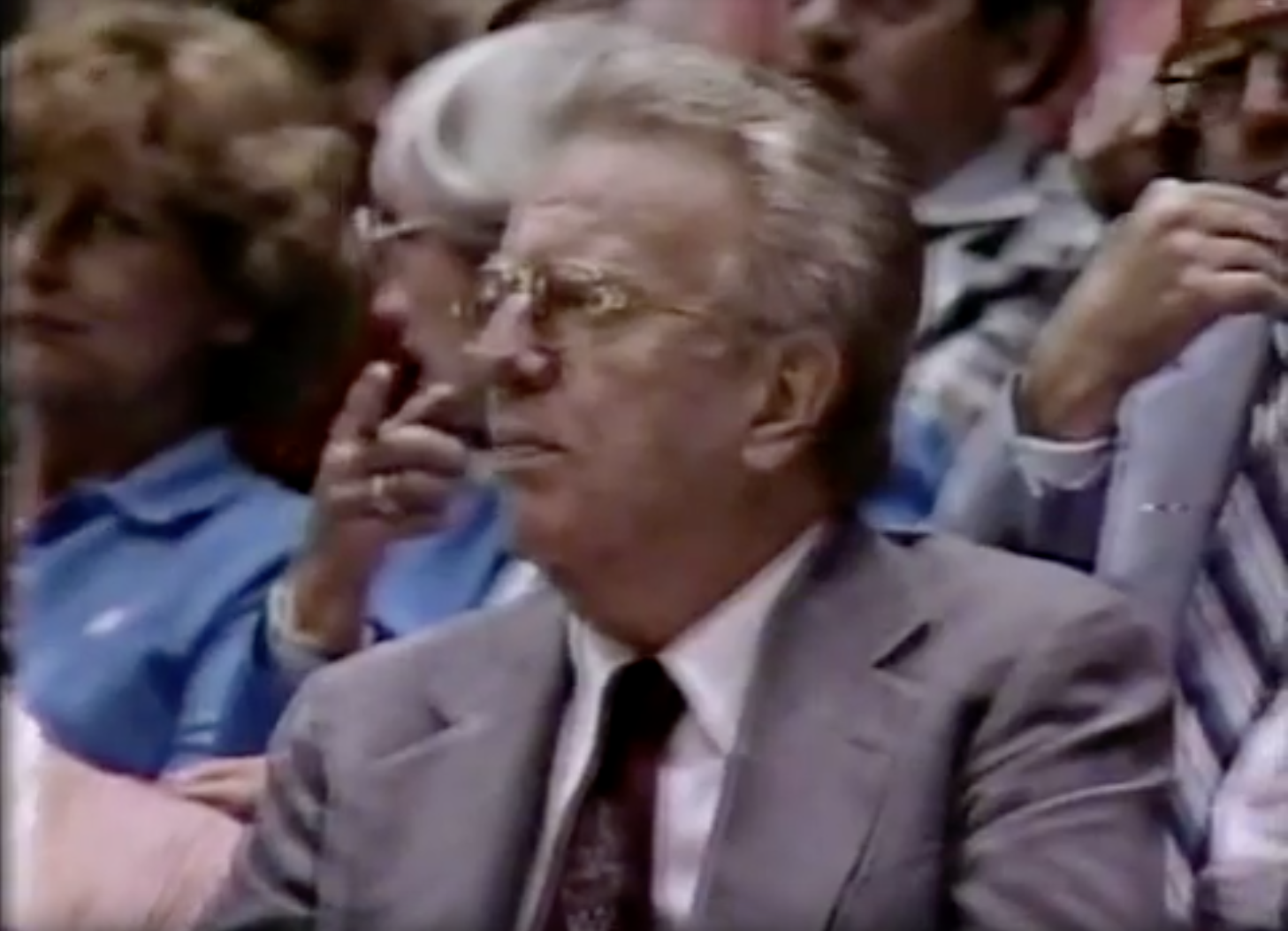
Barry pointed out on commentary that the 10-2 offensive rebound advantage in the quarter allowed the Rockets to take 30 shot attempts in the opening quarter, a dozen more than the Celtics. That should have alerted the Celtics to be more assertive, because the Rockets ended the game taking 103 shot attempts, while the Celtics only mustered a meager 74 attempts. The pace and style of play was determined and asserted by the Rockets early on, facilitating the ball and methodically working the ball into open space for shooters, or to drive the lane with. Larry O’Brien, then Commissioner of the NBA, was in attendance, and even if he doesn’t look like it, he had to have been pleased with the Rockets’ eighth consecutive sell-out, as CBS’ regional marketing approach at the time seemed to be paying off in markets with successful franchises. The Rockets were 14th in attendance this year out of 23 franchises, and had set franchise records9 in attendance, as well as a significant increase overall.
He had been Commissioner since the 1975-76 season, the same season he oversaw the NBA-ABA merger, settled the Oscar Robertson suit, negotiated a collective bargaining agreement, and modified the college draft. Two years later, he introduced the three-point line to the league, and despite the bad reputation of the NBA and the poor television coverage under his tenure, he would eventually bring the NBA to cable television with NBA on ESPN just two seasons later, 1982-83; the same year he negotiated another collective bargaining agreement, which also introduced the salary cap to the NBA, as well a drug-testing program that the players union agreed with. 1982-83 would be O’Brien’s final season as Commissioner, with O’Brien’s right-hand man David Stern taking over on February 1st, 1984, appositely so, considering Stern is the one usually credited as the person who effectively drove O’Brien’s best ideas.
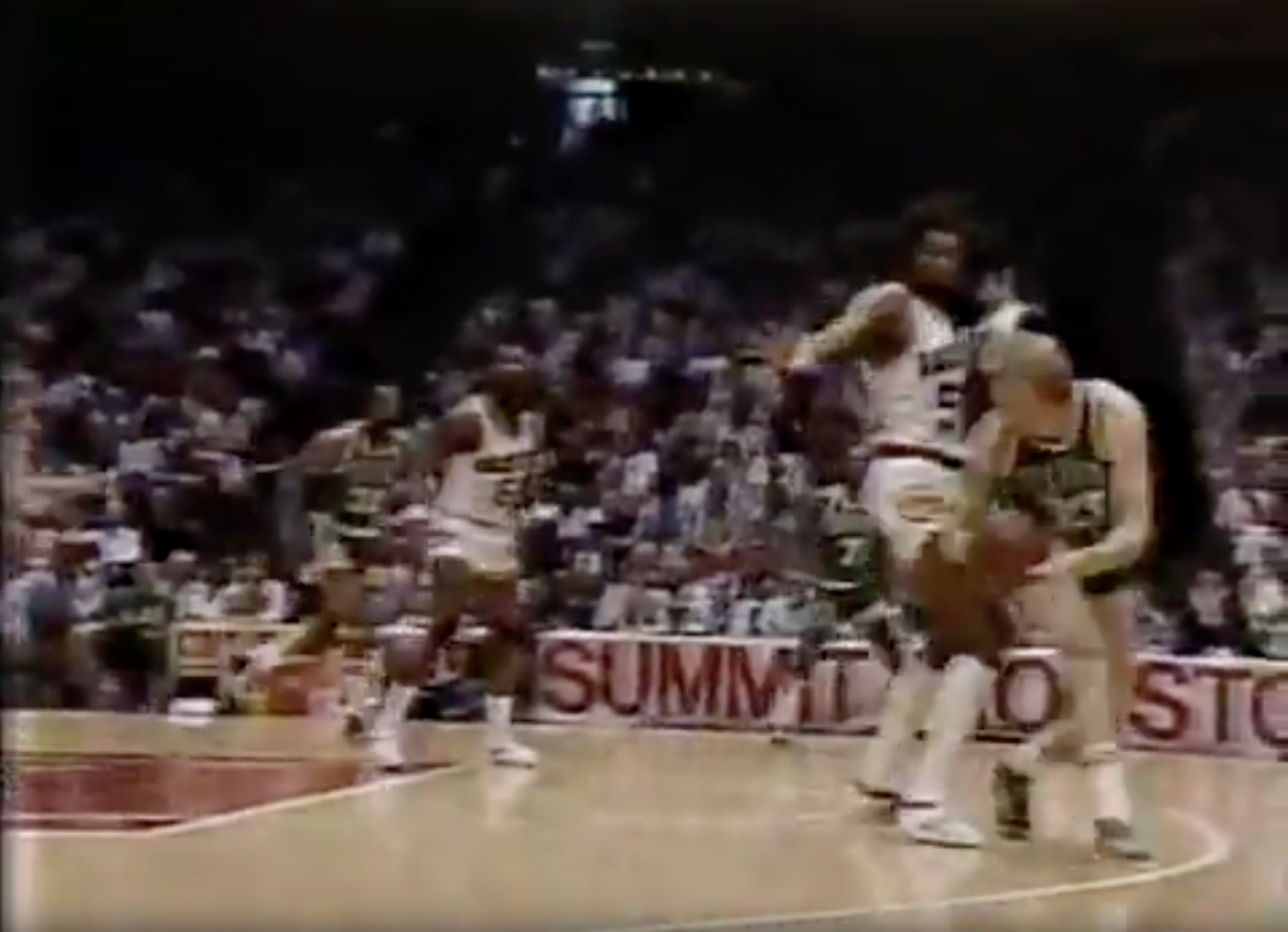
The Rockets would continue their synergetic effort, demonstrated in the opening minute as Reid hit a jump shot to take the lead, and then by virtue of his continual outstanding defensive effort on Bird, the Rockets were then able to get a steal when Bird was forced to give the ball up to Robey, who was swiped from behind by Dunleavy. The Rockets would push the ball up, feed it to Malone, and watch as he bullied past Robey for an easy lay-in at the rim. Archibald would counter with a shot similar to the one he missed at the end of Game 2, connecting this time with a defender in his face, and then the Celtics would run the break on the next possession, capped off by a pass from Carr to Maxwell in mid-air as he faked the jump shot, resulting in an easy, wide open lay-in. The back-and-forth affair lasted all quarter, with each team giving the other their best in a hard-fought tie at a pivotal moment in the series. Robey would pick up his third foul with a little over eight minutes remaining in the first half, and Parish would check back into the game, where he would stay; ending the game with 38 minutes played. Robey had done an outstanding job in Game 3 on Malone, but in this game, he was rather ineffective. His 10 minutes would see him turn the ball over the same amount of times he committed a personal foul, grab only one rebound, and be generally outclassed by Malone in every conceivable way.
Malone would score the first eight of his 24 points during this time span, and it’s worth noting that even though he once again shot poorly from the field, his gritty play style headed the charge for a Rockets victory in this game. He would only shoot 11-for-30, and 2-for-2 from the line, but his intense defense in the paint and series-high 22 rebounds were the primary factors in the Rockets being in complete control of the pace in this game. Maxwell started off by conserving his efforts in order to better play his role as the efficient secondary option, but he began asserting himself even more as the game went along when Bird was unable to manipulate the defense as he had in the previous game. Somebody had to step up if the Celtics superstar was going to be held in check for the first time all series, and thankfully for the Celtics, it was their second-best player who answered the bell. His presence inside would make the game easier for his teammates, as his team-high 24 points and 14 rebounds would allow for better spacing for the other players on the team, as everyone else in the lineup had a reliable jump shot. Of course, when Bird’s shooting is off and he’s unable to do much of anything offensively, the team as a whole is going to suffer, but unlike Game 3, the rest of his teammates were unable to produce similar results, rendering Maxwell’s performance meaningless.
Malone was on top of his game in this one, constantly battling for and winning the inside positioning against a more passive Parish, so it’s really no surprise how he was able to grab over 20 rebounds in this game. Bird and Parish would both grab a dozen rebounds a piece in this game, meaning that the trio of Maxwell, Bird, and Parish grabbed 38 of the Celtics 47 total rebounds; another reason that led to the Celtics letting this game get away from them. Archibald would be rather ineffective in this game as well, as his three assists matched his three turnovers, meaning that Bird’s rather trite seven assists were the only thing the Celtics could muster in terms of ball facilitation. Every starter, save for Archibald and Bird, and even one of their bench players, had at least two fouls by the 6:30 mark of the quarter, placing the Celtics in a tough spot for the second half. They led by one at this point, and inserted McHale into the game for the first time, after Fitch almost seemingly forgot about the depth of his frontcourt. Reid’s offensive rebounding, as well as the Celtics inability to get anyone other than Maxwell going, allowed the Rockets to cut into the fluctuating three-point Celtics lead, and actually take a two-point lead with 4:54 remaining; turning the game back into a back-and-forth affair for the remainder of the half.
Bird would pick up his first foul in the final three minutes of the half, and McHale would pick up three fouls in that six-and-a-half minute time span. The Celtics, despite shooting significantly better than the Rockets, resorted back to turning the ball over more than their opposition, playing passively while not facilitating the ball anywhere close to their standard, and failing to secure the rebounds necessary to prevent such a grinding effort by the Rockets. Barry says the Celtics should feel good about that however, and it’s actually hard to disagree when you put some thought into it. The Rockets went into this game after a disappointing and embarrassing loss at home the night prior, something the NBA also did the year prior in the 1980 NBA Finals, when Game 3 and Game 4 were also played back-to-back, but hadn’t been done since the 1965 NBA Finals. Malone was noted as being known for playing poorly on the second game of a back-to-back, and so, Harris and the Rockets decided to come out and give the Celtics everything they had in what would have been their final home game of the season if they hadn’t won. I’m certain the Celtics were aware of this, and psychologically checked out in order to conserve themselves for the long haul, because it was apparent that the Rockets at their best weren’t going to be able to manage four convincing wins in a seven-game series against this Celtics squad.
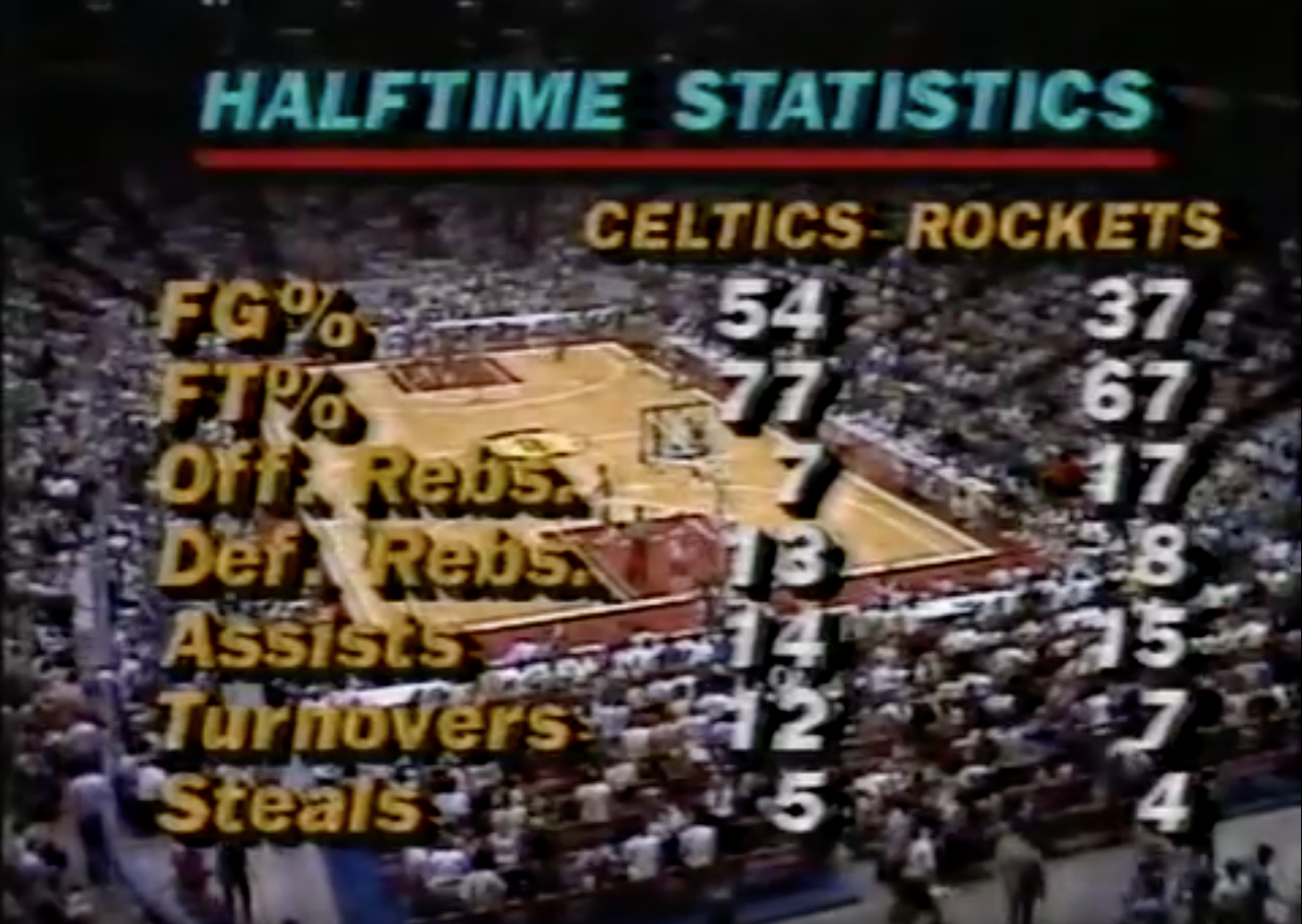
A difference of 20 shot attempts separated the two teams at the half, and the Rockets doubled down on that philosophy to start the second half, grabbing three offensive rebounds, resetting the offense and keeping the clock rolling until Malone was able to establish position, and bully his way inside and make a shot off the glass. The Celtics would turn the ball over, and the Rockets would keep recovering loose balls in the half court, as well as snag offensive rebounds at a tremendous rate. Nearly two minutes of clock would be run off with only two points to show for their effort, but the Celtics uninspired effort made their intricate offense appear incredibly pedestrian in this game. The Rockets would lead by two with just 9:26 remaining in third quarter, but they would soon be rewarded for their effort by taking an eight-point lead by the end of the quarter.
It began with the Rockets constantly feeding the ball to Malone, who continued to back Parish into the low post, wait for Bird to come help with a double-team, and score over both defenders after their block attempts came too early. The Rockets would take a six-point lead by the time the Celtics called a timeout at the 8:25 mark, and then after stout defensive pressure, thanks largely to Paultz’s return, the Rockets once again fed Malone, this time due to a mismatch on a quasi-fast break, and the lead was then extended to eight, where it would then remain a back-and-forth for the remainder of the quarter. The Celtics cut it to four quickly after, but Dunleavy would continue his strong play, swiping the ball from a posted up Parish, and then run the length of the court and make a tough layup against two collapsing Celtics defenders. Fitch called a timeout despite his players attempting to make something happen, and the morale of the team had to have dwindled in that moment.
Dunleavy would continue to make himself a viable scoring threat in this game, scoring 24 of his series-high 28 points, which was also a career playoff-high, by the end of the quarter. One of his shots would be a wide open three after Gerald Henderson found himself in the stands after trying to bat the inbounds pass out-of-bounds, but more importantly, two mad scrambles for loose balls had taken place in the final five minutes, with both scenarios favoring the Rockets in the end; demonstrating exactly which style of play was being enforced. Dunleavy would drive the lane and make an underhanded layup at the buzzer to make it a 75-67 Rockets lead, all with only one substitution thus far.
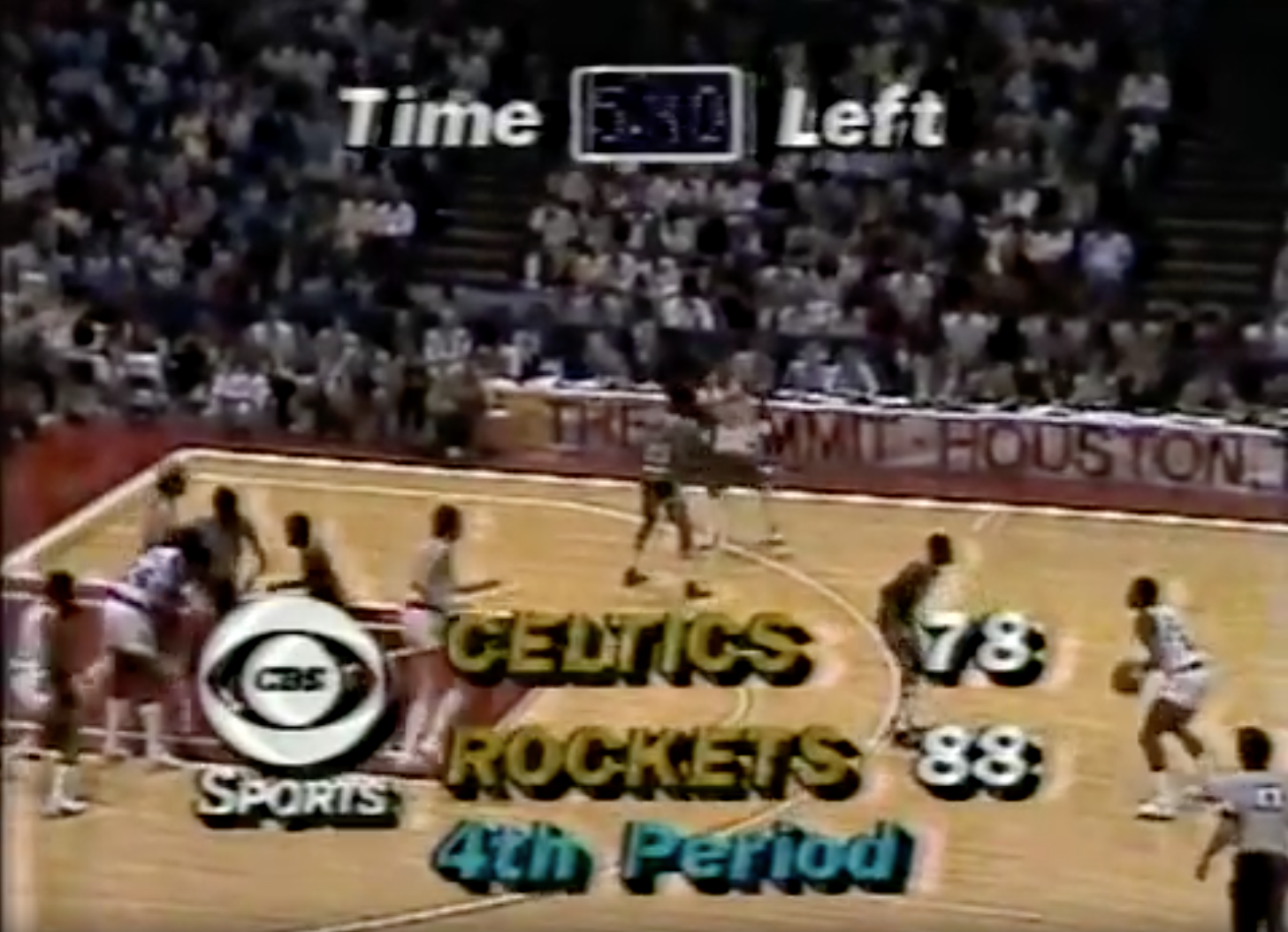
That would change, as Willoughby would be subbed in, sliding Reid up to the shooting guard position, and Dunleavy to the point. The fourth quarter would play out largely like the game as a whole, with nothing eventful really going on other than the continual shuffling of player positioning as Willoughby remained in the game while Henderson checked back in for Dunleavy. Malone’s offense was the engine that drove the system to a win, as Dunleavy’s offensive effort, Reid’s aggression on both ends, and the team’s overall effort was centered around his abilities to grab rebounds and control the paint, which he did an admirable job of in this game; evidenced by his stat line I informed you of earlier. Maxwell attempted to keep the Celtics in this game, scoring eight points in the quarter and staying active on the offensive boards, but it was his decision to start running the break when his team was down 10 with a little over five minutes left to play that inspired the team to actually put forth some effort. Maxwell’s 21st point of the night came on his first made free throw with 4:48 remaining, cutting the lead to 88-81, and the Celtics responded by barreling into the paint on the next possession, trying to get Parish going, while likely putting pressure on Malone to not pick up more fouls in the waning minutes.
Parish and Maxwell would both miss one free throw each in that time span however, so when the Rockets rolled the shot clock all the way down on the next possession, leaving the game clock with just under four minutes to play, Reid maintained the gap between his team and the Celtics by hitting a mid-range jump shot to take a critical 90-82 lead. The back-and-forth would continue, but all the Celtics could do was find Maxwell under the rim for an easy layup off-the-glass with 1:10 remaining. The lead would be cut down to 91-86, but after a good defensive stand, Parish would heave the ball downcourt to a streaking Gerald Henderson, who would walk out-of-bounds with the ball; effectively ending the Celtics’ chances of winning the game. The Rockets would run the shot clock down, and the Celtics would get the ball back with 17 seconds remaining, down by five. A missed three-pointer would be rebounded by Malone, and after passing the ball up court to Tom Henderson, the final seconds would tick away, and the Rockets would be walking off the court with a 2-2 tie in the Finals against the heavy favorites; largely without Malone needing to dominate the ball as much as he had been. The Celtics would need to prove this game was only the result of the Rockets’ determination to not lose twice at home in hard-fought, back-to-back games, and they would have to return to their style of play in order to do so.
Game 5 – May 12th, 1981
Each team had the other in a headlock, and with the tie inevitably needing to be broken, all eyes were on the Celtics to beat a team they were viewed as being far superior to already. A lot of people were surprised to see the Celtics struggling with these gritty underdogs, and it certainly frustrated the Celtics to have to exert themselves so much. Extra motivation from opposing trash talk is often described as being “not needed” in professional settings by athletes and coaches, but I have no doubt that Malone’s trash talk prior to Game 5 was used as extra motivation by the Celtics in this 29-point blowout in the Boston Garden.
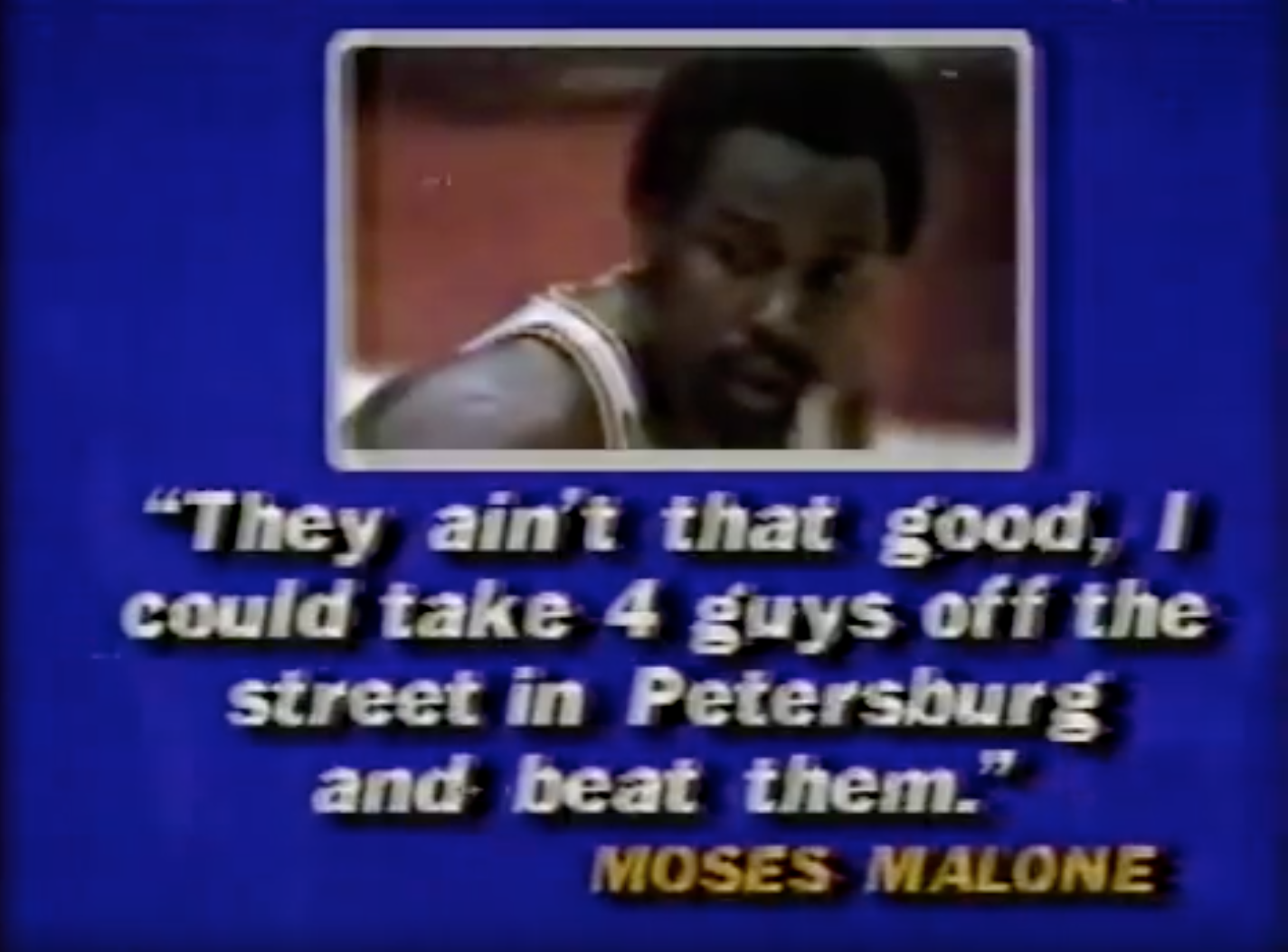
In all reality, the Rockets should have been thankful to have been in their position. An early 6-0 lead by the Celtics within the opening minute-and-a-half would be all the proof needed that the Rockets simply didn’t have the personnel to match the Celtics in a seven-game series. They could make it tougher for the Celtics by slowing the game down, steal a win on the road and fight hard for a win at home, but they couldn’t fake it forever. Harris would be forced to call a 20-second timeout after just a minute-and-a-half of play, and the Rockets would attempt to slow the game down, getting their first basket at the two-minute mark, courtesy of a patient half court set that saw Dunleavy penetrate the defense with motion around him, leading to him dumping the ball off to Paultz for a turnaround hook in the post. The Rockets would make two stops, and run their own fast break, tying the game up quickly, and forcing Archibald to settle the offense down. A back-and-forth affair would ensue, culminating in a 14-13 Rockets lead with 6:14 to go in the opening quarter. Adjustments would need to made if they were going to prove they were the better team, as the Rockets were threatening to keep things close in this pivotal Game 5.
A play would be drawn up for Bird to receive the ball on the elbow that would allow him to take two steps and either post up or take the shot, and he used that moment to bury his first shot of the game with a short fadeaway. Maxwell had already shown a willingness to attack, slicing through the lane on the quasi-fast break along with Archibald to heap pressure onto the defense, so if Bird was going to be able to start getting his shots to fall, the Rockets weren’t going to have an answer for the Celtics. Maxwell would once again lead the Celtics, and in this case both teams, in scoring with 28, his series-high. His 28 points would also come on 10-for-13 from the field, as well as excellent defense and his game-and-series-high 15 rebounds. Bird would crack the 10-point barrier the Rockets had subjugated him to since Game 2, but his 12 points would come on 5-for-16 shooting, so his first shot wouldn’t be the sign of him shedding the slump, but it would establish that the Rockets understood it was better if they were able to not allow Bird to score at will against them. After that first shot looked rather effortless for him, the Rockets double-teamed on the ensuing possession near the three-point line when he was briefly wide open, and he found Ford, who made a simple cut to the basket for an easy layup. Regardless of if Bird was scoring efficiently or not, the fact he made them fear his jump shot early on would open the floor up for his teammates, just like in Game 3.
The Celtics’ fast break, led by strong contributions from Maxwell and Parish, would see the lead increase to 10, 25-15, with only 3:17 left in the quarter. It wouldn’t end much better for the Rockets, as the Celtics would reach 32 points before the Rockets made another basket. Maxwell would make a shot under the basket, draw a foul, and convert the free throw to give him 10 points, which surprisingly enough, was second on the team after the opening 12 minutes to Parish, who had 12 points. The Rockets would make two baskets before the buzzer, but Archibald would draw up a play for Ford on the elbow, and he made the shot with 17 seconds remaining in the quarter to give the Celtics a 34-19 lead after stout defense by the Celtics prevented the Rockets from scoring in the final seconds of the quarter. Robey would check into the game in place of Parish, and Leavell would see the court in place of Dunleavy to start the second. Aggressive defense, sloppy play, and mad scrambles for the ball would be a majority of the action in the opening minutes of the second, but the Celtics would seize control of the game once more with their fast break. The 97.5 pace in this game was the fastest of the series, so to see the deficit increase so quickly as a response to what the Rockets were attempting to replicate from previous games in the series is the type of game planning that deserves to be commended.
The lead would balloon to 20, but the Rockets would make a run to cut it back down to 14, largely based on Malone bullying Robey in the post, and Reid’s defense on Bird in the half court. Archibald had been unable to shake Leavell, relying largely on open jump shots, but Gerald Henderson didn’t generate much offense in this game either, as the duo combined for eight points on 4-for-14 from the field, with five assists to four turnovers. Leavell saw 24 minutes of playing time in this game, and even though Murphy would be the guard who was first subbed into the game, he would only finish with 12 minutes of playing time; benched after injuring his shoulder on a hard crash to the floor after bumping off Robey on a dive for the ball. His passive play wasn’t generating much offense for the Rockets up to that point anyway, but to not have the option to use a guard off the bench after asking so much of his starters in Game 4, Harris had to have known that his team’s chances of winning this series were incredibly slim going forward.
Bird’s positioning would be key in manipulating the Rockets defense as it had in previous games, as even when Reid was on him and he was further away from the elbow, standing on the three-point line, Bird would simply feed Parish in the mid-range for turnaround fadeaway jumpers over the shorter Malone. Parish would score 14 of his 18 points in the first half, as he slowed down significantly in the second half, leading to him shooting only 6-for-14, but his strong play in this first half would be instrumental to the insurmountable lead the Celtics piled up early on. A back-and-forth affair was punctured by the Celtics fast break, and the lead that the Rockets worked so hard to chip away at had returned to 20 with just over three minutes left in the half. Bird would end the quarter with a shot near the basket, securing his eighth points of the night, and giving the Celtics a 22-point lead at the half. The Rockets had turned more to their bench than in the previous game, and even with the additional substitutions of Leavell and Garrett, they had no answers. They were going to try to make Bird’s teammates continue to beat them, and much like in Game 3, the Celtics were having no issue with doing so.



The Celtics were better than the Rockets in every conceivable fashion this game, and the halftime statistics proved it. If the Rockets were going to try to have an overall team effort, then the Celtics were going to do everything they could to speed the game up and make it harder for them to execute. Reid would only shoot 3-for-11, which isn’t much better than his shooting percentage in Game 4, when he shot 7-for-21, but his aggressiveness, as well as his team’s overall rebounding, made it more important that he actually look to get his shot going, but they desperately needed him to actually start making these shots now, like he had in Game 1. Malone would only score seven more points in the second half, and the performance Dunleavy put on just a game ago was apparently a one-time deal, as he had just three points at the half, and would end the game with five.
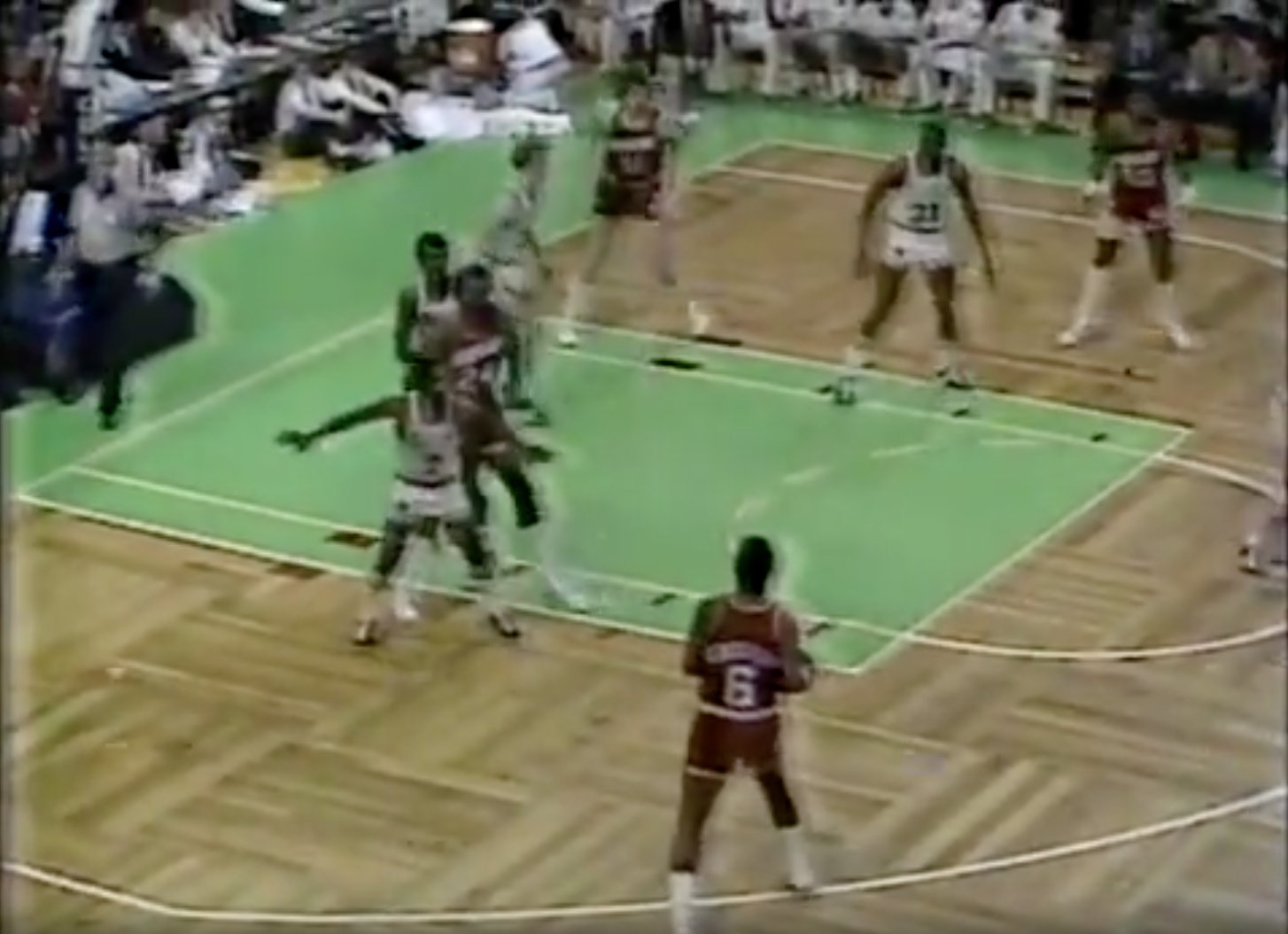
The Rockets would attempt to get themselves back in the game by feeding Malone, but the Celtics wouldn’t allow Malone to beat them by himself, especially with such a large lead, so they prevented most of his post up opportunities by having the point guard sag off their defensive assignment to cut off Malone. When Malone’s 20 points leads the team in scoring, and his 7-for-14 is the most efficient shooting from any players on the Rockets’ rotation, then they’re going to have to grab a tremendous amount of offensive rebounds to win games with their hustle, which was the entire point of the Celtics coming out to crush them in this game after seemingly conceding a game on the road in a hard-fought back-to-back. There’s not much more to cover, as to go into intense detail of the back-and-forth affair for the entirety of the second half in a blowout game would be incredibly ornate. Instead, let me discuss the most awkward moment in NBA broadcast history, as Bender pulled up images of Russell and some of the best collegiate basketball players in the world from the 1956 Olympics, and Barry decides to describe Russell in an incredibly demeaning way.
I don’t know, looks like some fool over there with that big, uh, watermelon grin over there on the left.
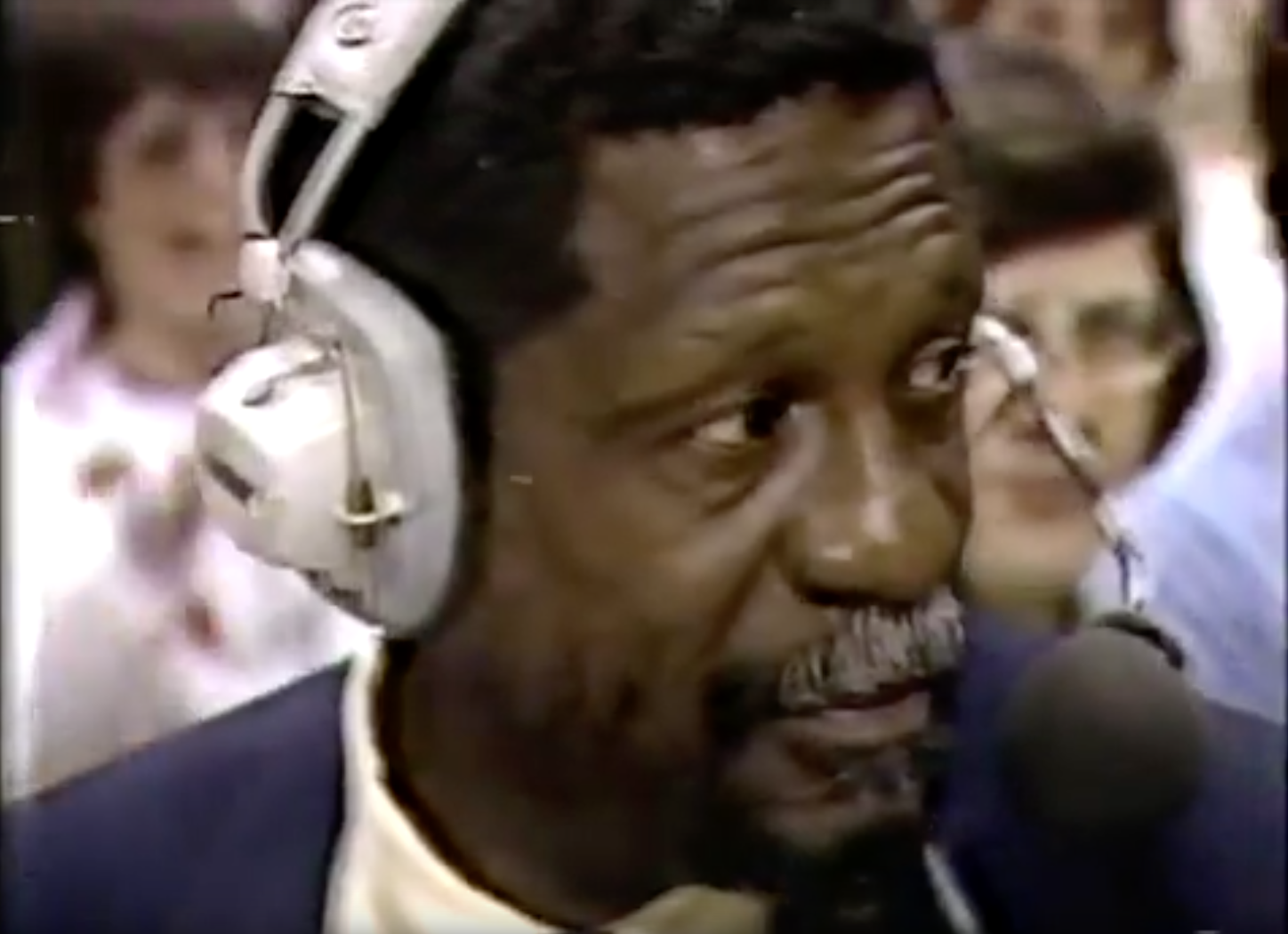
Barry was known for being a huge dick during his playing days10, but always claimed ignorance for the racial overtones in his remark, which Russell did forgive him for, but his sheer lack of class and knowledge was laid bare for a national audience. Regardless of if Barry was aware of the racial overtones in his remarks, Bender should have absolutely conducted himself better and not prodded Barry to continue questioning Russell about his feelings on the pictures. CBS however, should receive a lion’s share of the blame, as they could have edited this segment out of the taped broadcast, but I suppose that would have required them to care about their product a little more than they did at the time. The video is available for all to see after years of being censored by the powers at large in the NBA, and it’s important that we as fans never let this incident to be forgotten, as a reminder to think twice before saying something idiotic, and so we can continue working toward a better society.
The only aspect of the actual game worth talking about was that Major Jones from the Rockets saw his minutes increased significantly after not seeing the court until Game 4, where he only played four minutes anyway. He scored four points on simple pick-and-rolls in the third quarter, and scored seven points on 3-for-6 shooting overall, although he only went 1-for-3 from the line. McHale saw playing time in the waning minute of the third, and most of the final quarter, but only after playing limited minutes in the second quarter. It’s just fascinating to see McHale come out strong off the bench in Game 1, only to become a non-factor in this series with limited playing time, especially when you know the Celtics dynasty reached its zenith when he became their starting power forward. Carr’s 11 points in 17 minutes, as well as the defense, energy, and hustle he brought off the bench, would be what ultimately sealed the Rockets fate, as even when they slowed the Celtics’ fast break down in the second half with the full-court press, they were unsuccessful in developing their own offense, wasted too much clock, allowed the Celtics to win the rebounding battle handily, and were once again outscored in the quarter; 32-25.
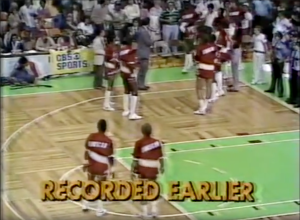

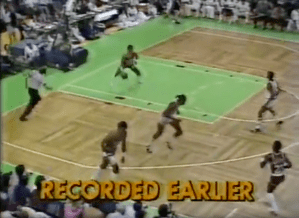





After airing the games in Houston live, CBS returned to their standard tape-delay broadcast procedure, and as the penultimate Finals game aired on tape-delay, I think it’s worth noting what exactly went into preventing this from happening ever again. The NBA would soon undergo a renaissance in marketing and branding with the Magic-Bird, Celtics-Lakers rivalry, and the rise of cable11, but the start of overcoming the then record-low Nielsen score for this Finals began with the scheduling of next season, as the season wouldn’t begin until late October, as was custom prior to the previous two seasons, when they began in early October. This meant the Finals would no longer be taking place right before, and ultimately extending into the Sweeps period for the Nielsen ratings, where the networks highest-rated sitcoms would do substantially better before the summer drag of television programming. This allowed the NBA Finals to dominate the early portion of that summer drag, and set in motion the beginning stages of the nationwide phenomenon that was Bird vs. Magic.
Game 6 – May 14th, 1981
The final game of the series would feature Barry and Bender calling their final games for the NBA on CBS, and in Barry’s case, CBS in general. It’s admirable Russell went out there and continued to do his job when he could have refused to call the final game with the duo, instead preferring to allow these issues to be resolved behind the scenes; conceding the spotlight to the game. Things would be handled much differently in today’s society, but for the time being, this was the best the network and the league could do, I suppose.
For all intents and purposes, the Rockets were on life support. They shot 37.9% from the field for the entire series, and their 41.9% in this game likely made their shooting percentage better, as the only other games in the series that saw the team shoot 40% or better from the field overall were Game 1 and Game 2, where they only shot 42.4% and 40% anyway. A 6-0 Rockets lead was possible due to pressure in the post from Malone and Paultz, as Malone was on a mission to out-rebound everyone in his path, and did so with 16 rebounds in this game, while also converting two of those three made shots in the early 6-0 lead. Malone’s 11 rebounds in Game 5 would be his series-low, so to see him anchor the post and inhale misses off the glass like his usual self was a good sign for the Rockets that they were capable of winning their final home game of the season. He wound up shooting 9-for-21 from the field while scoring 23 points, second only to Reid’s second 27-point game of the series, coming on 12-for-24 shooting.
Bird would lead his team in rebounding with 13, and would start off slow with his scoring once more, but ended the game tied with Reid in the overall game-high with 27 points. The difference would be his teammates, as even though Bird shot 11-for-20 against Reid’s smothering defense, Reid would finally be forced to match the superstar forward in points production, against Maxwell nonetheless. Since Malone and Paultz were the only other viable scoring options in this game, the Celtics had no chance of losing when their entire starting five scored in double figures, with Maxwell and Parish both nearly scoring 20, which would’ve put three players in the Celtics starting five over 20 points in this game. The one-point lead after one quarter would be severely misleading, as the 11-point gap that gradually widened as the game progressed aptly represents the skill difference between the persistent Rockets and the overwhelming Celtics.
There’s not much to comment on, and luckily I prefaced the slow pace of the game already by mentioning earlier how the game ended with a pace of an even 87. It’s the slowest-paced game of the series, and the Celtics were content with playing a half court game with the Rockets, incrementally using their fast break to overtake the Rockets and take an early lead they would never relinquish. The sloppy play that’s become synonymous with this series returns, and the referees weren’t helping matters with their quick whistle tendencies in this potential close-out game after allowing both teams to establish a physical tone all series.
Maxwell’s play is really the only thing worth noting in the quarter, as he masterfully cut inside, making shots under the basket at a remarkably efficient rate, even snagging rebounds and resetting the offense when necessary. His perimeter defense alongside Ford was pivotal in the Celtics’ harassing defensive scheme, and his performance this quarter largely demonstrated why he was so valuable to the Celtics in this series, as he was their unquestioned best player in Games 4 and 5, while producing the most points in the most efficient fashion during Game 3. His rebounding and defense had never faltered, so when Bender noted that Maxwell was a strong candidate for Finals MVP, Bird really should have gone for 30 points or more if he wanted to win that award, which he likely wasn’t concerned with anyway, at least, going by his post-game interviews12.
The Celtics’ bench would be inserted into the game early on, with strong contributions coming from Carr and Robey, but McHale would only see eight minutes of action, largely coming in the second. He would make his only shot attempt, but with Willoughby unable to stop Bird, and with Reid unable to hold him in check as he had for half the series, the Celtics simply did not have to call upon the rookie as much, not that they did or even had to for nearly the entirety of the series. Archibald’s nine assists would constitute a majority of the team’s overall assists, which further proves the Celtics didn’t have to go to their bench for long stretches of time, as their starting five was usually more than sufficient in carrying them to a victory, especially when Archibald has one of these quiet games where he’s secretly dictating the entire flow of the offense.


The spurious six-point lead nearly doubled by the end of the game, and I honestly wish that the technical difficulties of the tape in this particular copy of the game I was watching online wasn’t the most interesting aspect of the game, but there’s only so many ways I can continue to describe the laid-back, dominating approach the Celtics employed for this game. They were content with running their basic game plan, while also proving they could beat the Rockets with their own style. Bird would continue scoring in the second half, but his emphasis on scoring and rebounding meant he only racked up five assists in this game, which isn’t anything to be concerned with when Archibald has 12 assists, but it also meant Maxwell would show off an element of his game rarely seen in this series; dumping the ball off on the break to a nearby teammate for an easy assist. He would end the game with six assists, his series-high, but more importantly, his presence alone would deter the Rockets from allowing him to score at will. Even though he would only take 11 shots in this game, he connected on seven of them, as well as connecting on five of his six free throws, once again providing an incredibly efficient scoring effort to a team that had been struggling to find consistency anywhere else in the lineup. This undoubtedly opened the floor up for his other teammates, and with the Celtics top two players putting this kind of effort forward, the Rockets had no real chance of winning this game.
Archibald’s jump shot at the buzzer gave the Celtics a 15-point lead heading into the fourth quarter, and after shooting 60.7% from the field in the game through three quarters, the Celtics would surprisingly choose to ease their foot off the gas as the game drew to a close. Harris would start the quarter by inserting his athletic lineup, featuring Henderson, Garrett, Willoughby, Reid, and Malone, but when none of them have been scoring efficiently all series, then what good does this strategy to match the Celtics tempo do for you? Bird wouldn’t even be on the floor to start the fourth, and the Rockets still wouldn’t score for the first two-and-a-half minutes of the quarter.
Bird would check back in with 7:43 remaining, but the Rockets were on the verge of drastically cutting into the deficit, as they reduced the gap to 10, and even though the Celtics turned to Bird on the elbow, their offense continued to sputter. The Rockets would continue their free-flowing ways, as they had totally abandoned the system that had gotten them to this point in favor of drawing up plays on the fly, taking the Celtics off guard. A team that desperate is dangerous, and with 6:20 remaining, a visibly worried Fitch called a time-out, and then watched as his team continued to allow the Rockets to crawl back into this game, as the Celtics had scored only two points the whole quarter up to that point.
An 86-83 lead with 4:23 remaining would certainly suggest this game would be shaping up to be ending on an all-time classic finish after starting off so sluggishly, but that would be uncharacteristic of the play in this series. Bird took over, making a shot and then drawing a charge to give his team another possession, which ended with him making a jump shot at the free throw line after running around several screens. This would extend the lead to seven; back to where the Rockets had been at halftime. The Rockets would make their next basket, and then a short defensive stand by both teams would culminate with Malone hitting two free throws after a foul, and cutting the lead back to three. Maxwell would score twice, and after a strong defensive stand by the Celtics, they would masterfully move the ball around the perimeter to the open shooter, and let him make a play. He had Reid draped all over him on the closeout, but Bird’s jump shot didn’t fail him.
The made three would put the Rockets in a tough situation, as the deficit had returned to six, but Ford’s crafty steal from behind on Reid effectively buried the Rockets’ chance at a comeback. Reid’s foul in a desperate attempt to prevent Ford from stealing the ball was his fifth for the game, and the subsequent made free throws from Ford gave the Celtics a 99-91 lead with just 45 seconds remaining. The Rockets would miss both their shots in their final possessions, and would foul Maxwell and Ford in the final 30 seconds, during a game of hot potato with the ball against collapsing Rockets defenders with the sole intention of prolonging the game, and the series. Ford would make his second after missing the first, and then Leavell would race downcourt, and float a finger roll over the hoop, where Robey would rebound the ball and hand it to Carr, who simply dribbled back to the inbound line, and away from the two nearby Rockets defenders. The remaining three seconds would run off, and the Celtics would win their 14th championship in franchise history, their first championship in five years, and Bird and the 1980s Boston Big Three’s first championship.
Sadly, even Game 6 wasn’t immune to a tape-delay. Thankfully, this would be the last Finals Game broadcasted on tape-delay, but the Finals were still several years away from attaining the ratings that would rightfully permit the amount of media coverage they earn today. Bird, and Magic the year before him, had entered the league after facing off against each other in the legendary 1979 NCAA Championship, and after winning Rookie of the Year over Magic the year prior, Bird proved he too could win the big one. The stage would be set for the rivalry that would famously “save the NBA,” as the saying goes. It would just take a few years, and a little outside influence, before these two could meet in the Finals and bring that primetime energy to a game sorely in need of marketable athletes.
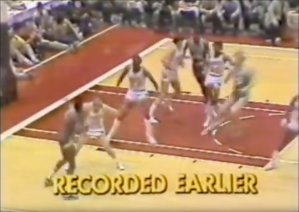
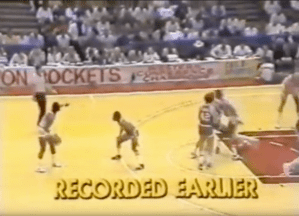

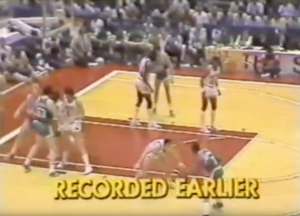
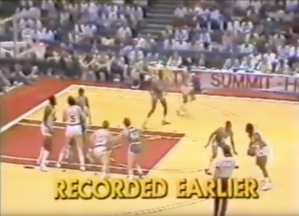

Final Analysis
The Rockets were just woefully impotent, as their rough, slow-paced brand of basketball would be fully exposed by the well-rounded Celtics machine. Bird’s 15.3 points and 15.3 rebounds per game averages in this seres are impressive, and his 15.3 rebounds per game would be the highest rebounding average of all five Finals series he played in, but it is hard to argue against Maxwell deserving Finals MVP. Bird’s performances in the first two games were spectacular, and I’d even excuse his lack of scoring or efficiency in Game 3 due to his activity in other ways that led to the blowout win, but Games 4 and 5 were all Maxwell. Maxwell also opened the floor up for Bird and the rest of the offense in Game 6 by virtue of the Rockets defense being forced to focus on him intently when he had the ball anywhere near the rim.
You can certainly argue Bird should have won the award for establishing the tone and controlling the offense as the secondary ball-handler behind Archibald, as Bird’s seven assists per game in this Finals actually led both teams. Archibald had a disappointing performance, only averaging 10.3 points on 36.4% from the field, while also contributing only 5.5 assists to 2.6 turnovers. This can be explained by a compromised ankle, and great defensive pressure from the Rockets’ backcourt, but it did help the Rockets prolong the series, as did Reid’s impressive defense on Bird. However, great players adjust and perform when they’re most needed, and that’s exactly what Bird did by dominating in Game 6 and hitting a clutch three to regain the Celtics’ six-point lead with barely a minute left in the series. It was a big moment, but without Maxwell’s defense, rebounding, and efficient scoring since Game 3, the Celtics may have never even been in that situation.
After keeping Malone on Maxwell for the first two games, the Rockets allowed him to score at will until Game 6, as they decided stopping Bird should be their top priority. Parish played well even if his 27.8 minutes per game average is due to constant foul trouble early on in the series, as the big man averaged 15 points per game on 50.6% shooting, as well as 7.7 rebounds and providing great defense, but Maxwell had the Celtics scoring-high with 17.7 points per game on a ridiculous 56.8% from the field; second on the team in rebounds with 9.5. Maxwell disappointed in Game 2, but Boston’s secondary option had his fun in the sun this series, walking away with a deserving Finals MVP that is often forgotten or purposely never mentioned.
Harris only could have wished for a secondary option as effective as Maxwell, as he soon found out attempting to suppress Bird only opened the Celtics up to other offensive possibilities. Malone would be the high-scorer for his team with 22.3 points per game, but his 40.3% from the field was also second on the team of all players with 10 or more shot attempts, as only Garrett and Jones shot 50% from the field for the Rockets, but took only nine and eight shots respectively throughout the entire series. Dunleavy’s 41.5% from the field would be the best the Rockets could muster on an individual level. Willoughby shot an abysmal 26.9%, and still received the sixth-most minutes on the team, just as he had all season. The Rockets were not capable of deviating from what Harris had instructed his core six players to do, even if Malone’s 15.7 rebounding average had essentially been stalemated by Bird’s 15.3, which gave the Celtics a 47.3 to 42.7 rebounding advantage; the one thing the Rockets had been desperate to control the entire series.
The Celtics were just far more complete, and were the first team since the 1971-72 Los Angeles Lakers to be the number one-seeded team in the entire NBA to win the championship. Harris was looking for a second scoring option while Ford was content with being the perfect quinary option, as he scored 10.5 points per game on 50% shooting, while being a willing passer and tough defender. Reid would be the second-best option for the Rockets, as his 14.7 points came on 37.5% shooting, while Tom Henderson’s 4.2 assists would come with 1.8 turnovers as well. Every player knew their role and excelled at it, contrasting greatly to the Rockets, who hadn’t even experimented with the athletic lineup much throughout the season or the postseason before Harris made them play together in Game 6. It’s commendable the Rockets were able to scrap together two wins against this well-rounded, early iteration of the Celtics ’80s dynasty, but most betters wound up winning big in safely assuming the Celtics would inevitably hoist its fourteenth championship banner.
Editor’s Notes
- 17:06
- UPI – 5/20/1981 – The fans loved it when Boston Celtics star Larry Bird finally spoke his mind
- Havarti – 8/31/2018 – Game Film: 1991 NBA Finals
- 8:42
- 8:29
- 32:59
- 38:08
- 26:07
- 24:40
- Slate – 11/24/13 – Big Jerk, Bigger Hero
- The Wages of Wins Journal – 2/13/2014 – Did David Stern Really bring the NBA Finals out of Tape Delay?
- Tom Shaer/YouTube – CBS coverage of Celtics win

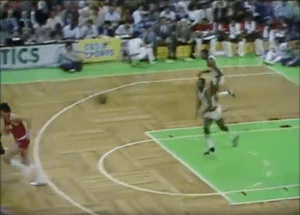


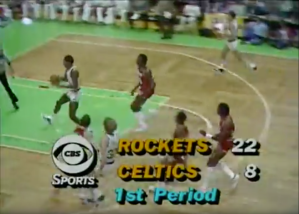












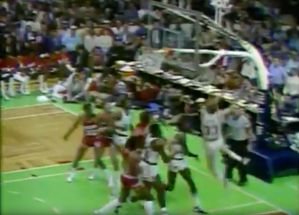









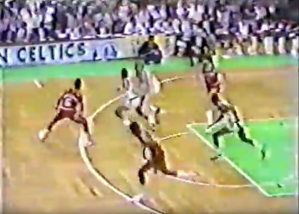
















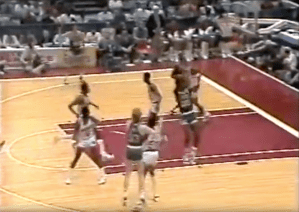



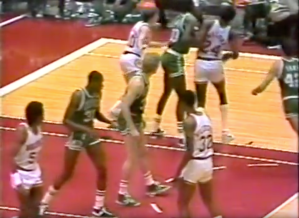


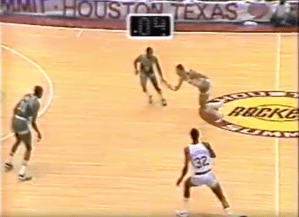

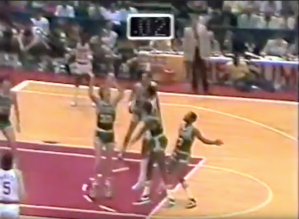
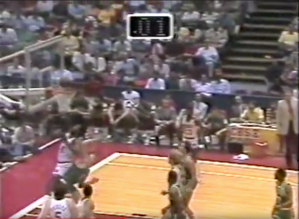




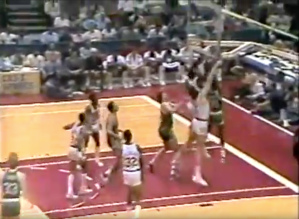






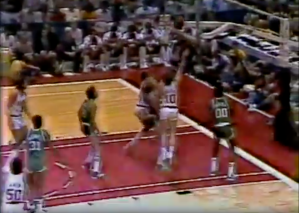



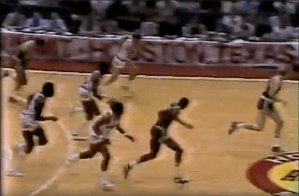





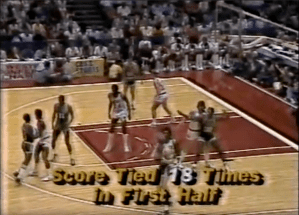






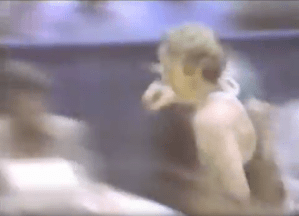










Moses Malone with that real Vicious Mockery lol
LikeLike
Larry bird with that 36.7% 3 point efficiency.
LikeLike
You mean 37.6%?
LikeLike